RBSE Class 10 English Grammar Tenses
Rajasthan Board RBSE Solutions for Class 10 English Grammar Tenses Textbook Exercise Questions and Answers.
The questions presented in the RBSE Solutions Class 10 English are solved in a detailed manner. Get the accurate RBSE Solutions for Class 10 all subjects will help students to have a deeper understanding of the concepts. Students can locate class 10 english first flight chapter 5 question answer are written by our panel of expert teachers.
RBSE Class 10 English Grammar Tenses
1. Tense-Tense is an indicator of the form of a verb in correspondence to our concept of time.
हमारी समय की अवधारणा के अनुरूप tense क्रिया की form को इंगित करता है।
2. Time - Time is a universal concept with three divisions-Present, Past and Future.
समय एक सार्वभौम अवधारणा है जिसके तीन प्रकार हैं--वर्तमान, भूत व भविष्य।
3. Difference between Tense and Time-Present Tenses doesn't always indicate Present Time because these also indicate Past Time, Future Time and Timeless state or action. In the same way, Past Tenses can indicate Present Time and Future Time. Future Forms can also indicate Present Time and Past Time. See examples :
Present Tenses हमेशा वर्तमान समय को ही इंगित नहीं करते है क्योंकि वे भूतकाल भविष्यकाल व समय-रहित (शाश्वत) स्थिति या कार्य को भी इंगित करते हैं। इसी प्रकार, Past Tenses वर्तमान काल व भविष्य काल को भी इंगित करते हैं। Future Forms वर्तमान काल व भूतकाल को भी इंगित करते हैं। उदाहरण देखें:
(i) Simple Present indicating Past Time : (historic present) (ऐतिहासिक वर्तमान)
In that (Past Time) film, the truth wins (Present Tense) ultimately.
India gets (Present Tense) freedom on 15 Aug., 1947.(Past Time)
(ii) Present Perfect indicating Past Time : (Showing past possibility) (भूतकाल की सम्भावना)
The students have (Past Time) already revised (Present Perfect Tense) their lessons.
Our team may have won (Present Perfect) the championship. (past possibility)

(iii) Simple Present indicating Future Time : (planned action) (नियोजित कार्य)
The President visits (Present Tense) Pushkar next month. (Future Time)
(iv) Present Progressive indicating Future Time : (planned action going to happenshortly) नियोजित कार्य जो होने ही वाला है
The C.M. is arriving (Present Progressive) Jodhpur tomorrow. (Future Time)
(v) Present Perfect indicating Future Time :
After you have passed (Present Perfect) this class, you will be promoted (Future Time) to the next one.
(vi) Simple Present indicating timeless state or action : (हमेशा होने वाला कार्य)
The moon moves(Simple Present) round the earth. (timeless action)
(vii) Simple Past indicating Present Time :
It's time (Present Time) we left (Past Tense) for home. (It is time to leave for home.)
घर चलने का समय हो गया है
I wish I (Present Time) stood first. (Past Tense) (काश मैं प्रयम आ जाऊँ)
(viii) Simple Past indicating Future Time :
She might (Past) come next Sunday. (Future Time)
He said that he would (Past) reach the following week. (Future Time)
(ix) Simple Future indicating Present Time:
He will (Future) be about nineteen. (Present Time) सम्भव है वह 19 वर्ष का है

(x) Future Perfect indicating Past Time :
She will have passed (Future Perfect) X class by now. (Past Time - अब से पहले)
4. Forms of Verbs-There are normally three forms of verbs. (क्रिया की सामान्यतः तीन forms होती हैं।)
I Form : इसे Base Form कहते हैं। यदि इसके अन्त में 's' जोड़ा जाता है तो इसे 's' form कहते हैं। और यदि इसके अन्त में 'ing' जोड़ा जाता है तो इसे 'ing' form या present participle form कहते हैं।
II Form : इसे Past Tense Form कहते हैं।
III Form : इसे Past Participle Form कहते हैं।
5. Kinds of Verbs --
(A) Verb-form की दृष्टि से verb दो प्रकार की होती है -
(1) Weak Verbs - इनके Past Tense Form के अन्त में -d, -ed या -t होता है।
जैसे - save - saved, help - helped, send - sent
(2) Strong Verbs - इन verbs की II form व III form बनाने के लिए -d, -ed या -t जोड़ने की आवश्यकता नहीं होती।
जैसे - give - gave - given.
(B) एक अन्य प्रकार से भी verb दो प्रकार की होती है
(1) Regular Verbs-वे verbs जिनकी past tense form व past participle form में -d या -ed जोड़ा जाता है।
जैसे - wave - waved - waved, call - called - called.
List Of Regular Verbs

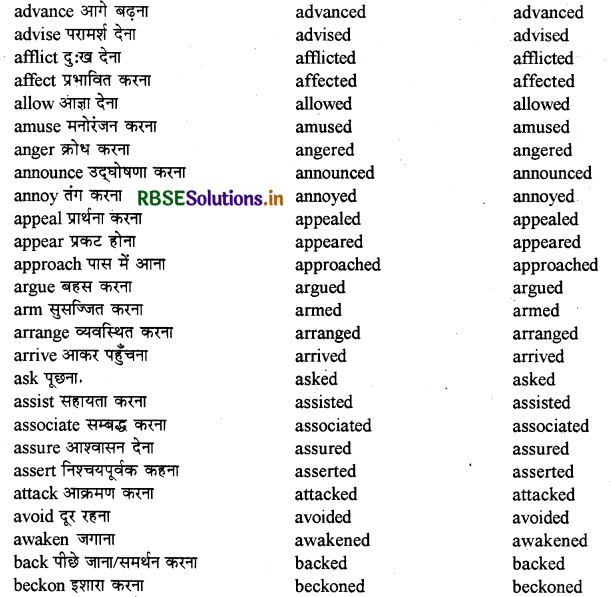
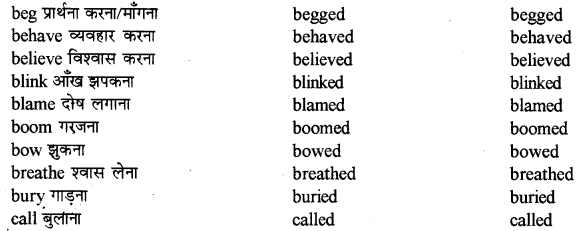

Note -
(i) यदि किसी verb के उच्चारण में अन्त में 'च', 'क', 'प', 'स' अथवा 'श' आये तो उसमें 'd'
अथवा ‘ed' जोड़ने पर उसका उच्चारण 'ट' होता है। उदाहरणार्थ-approach (अप्रोच) = approached (अप्रोच्ट)
(ii) यदि किसी verb के उच्चारण में अन्त में 'ट' या 'ड' आये तो उसमें 'd' या 'ed' जोड़ने पर
उसका उच्चारण 'इड' होता है। उदाहरणार्थ accept (अक्सेप्ट) = accepted (अक्सेप्टिड)
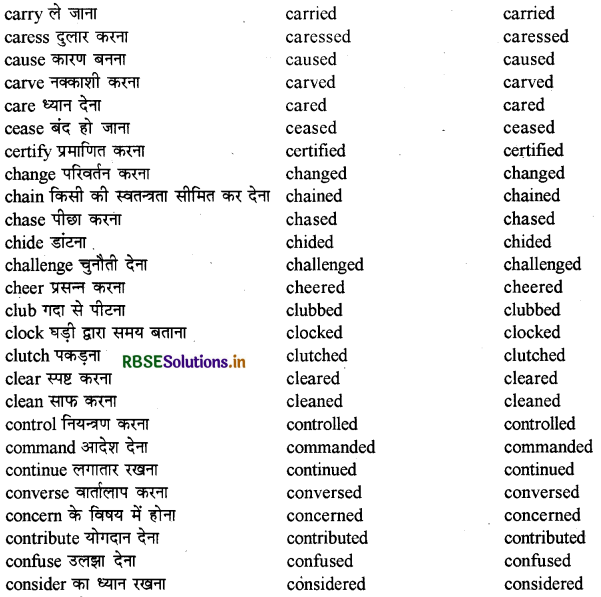
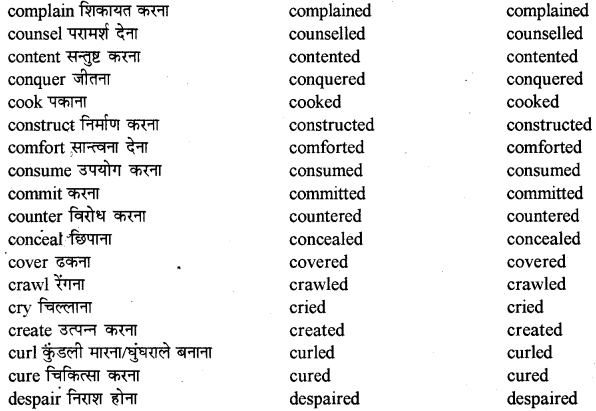
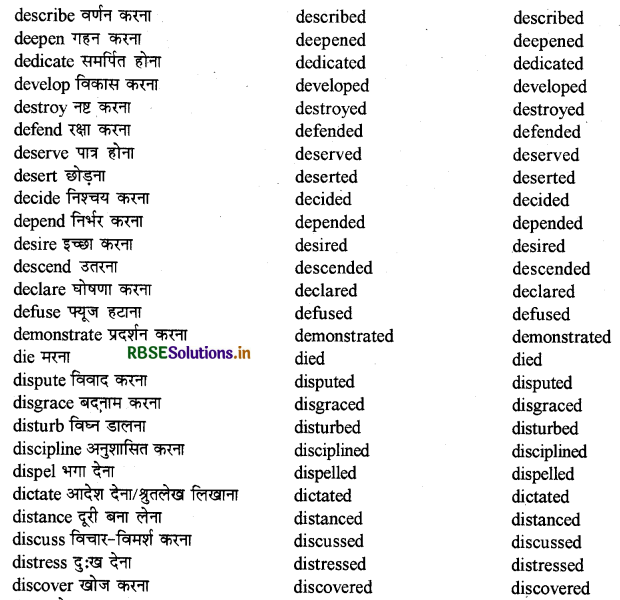
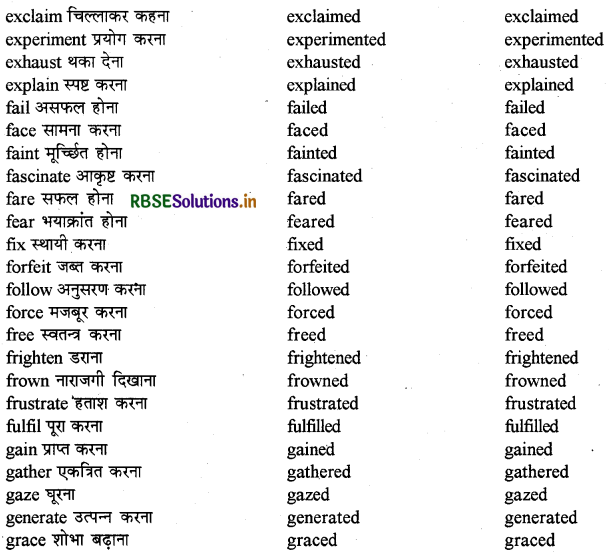
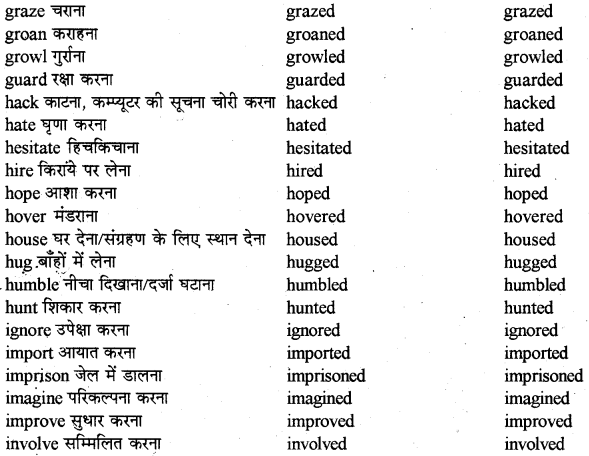
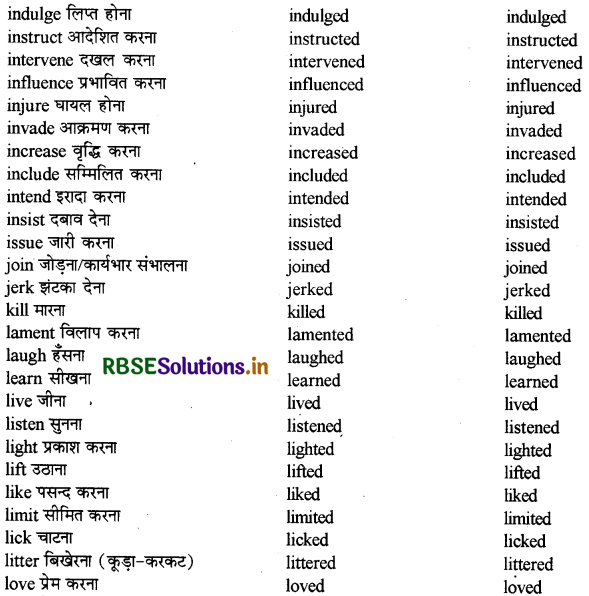
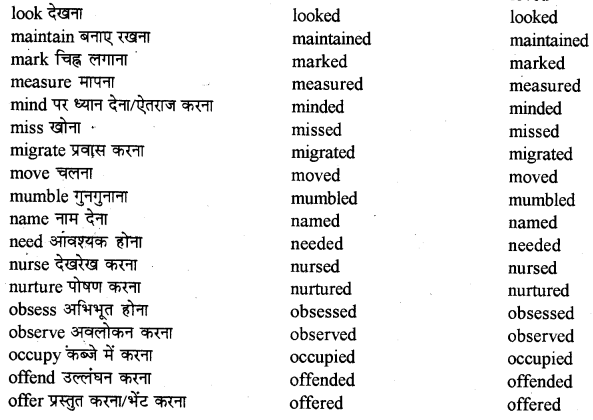
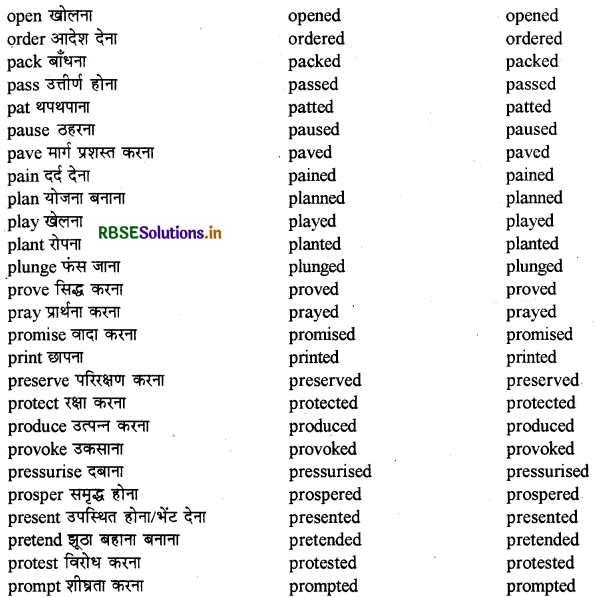
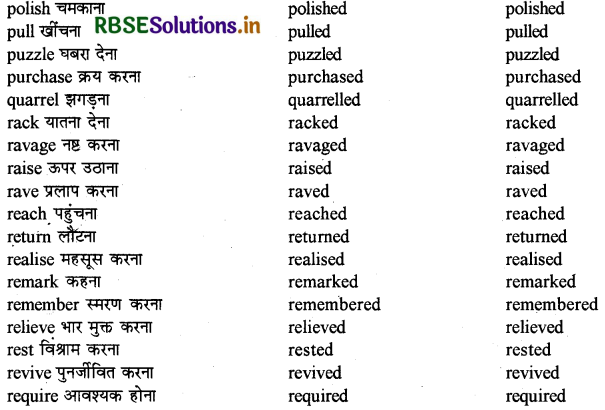
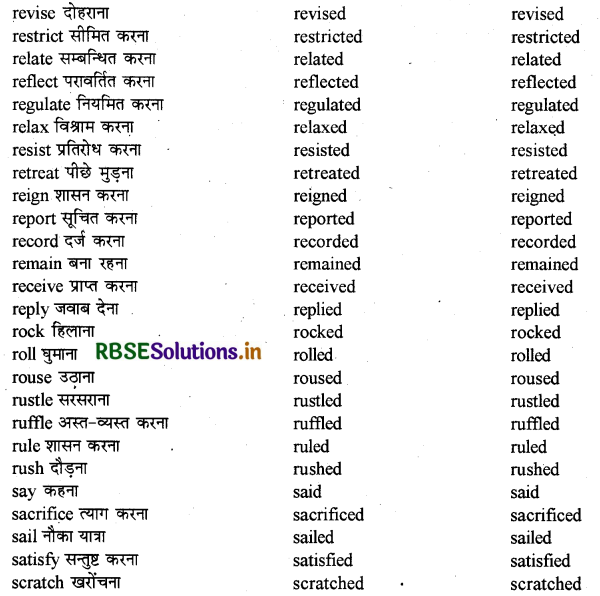
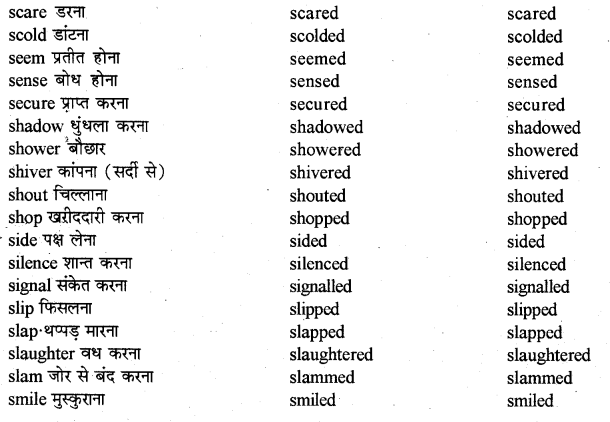
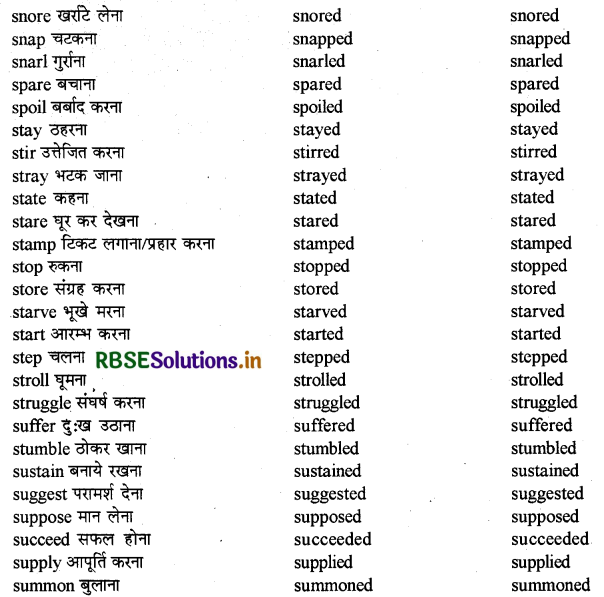
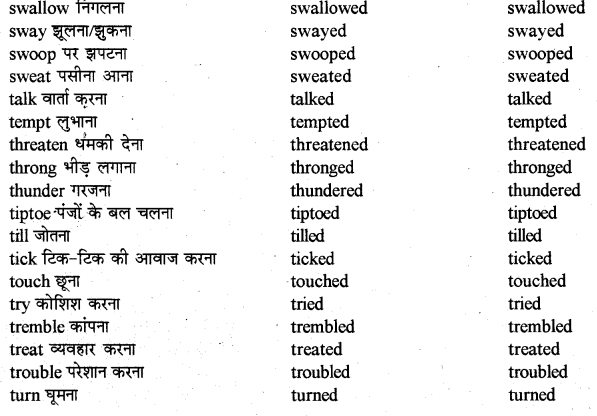

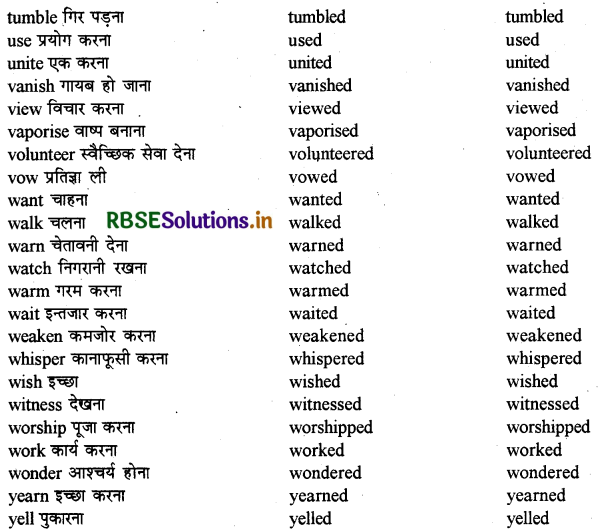
Irregular Verbs
(i) वे क्रियाएँ जिनकी तीनों Form समान होती हैं
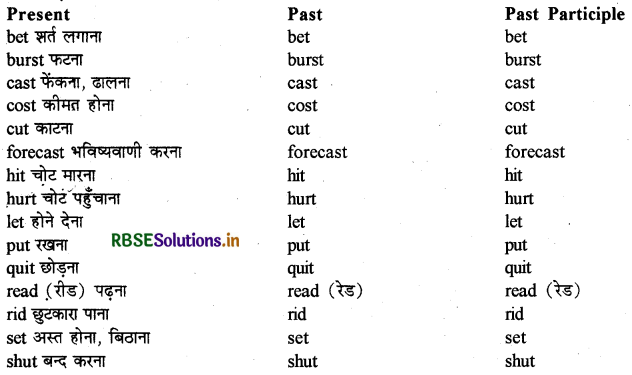

(ii) वे क्रियाएँ जिनकी II व III Form समान होती हैं
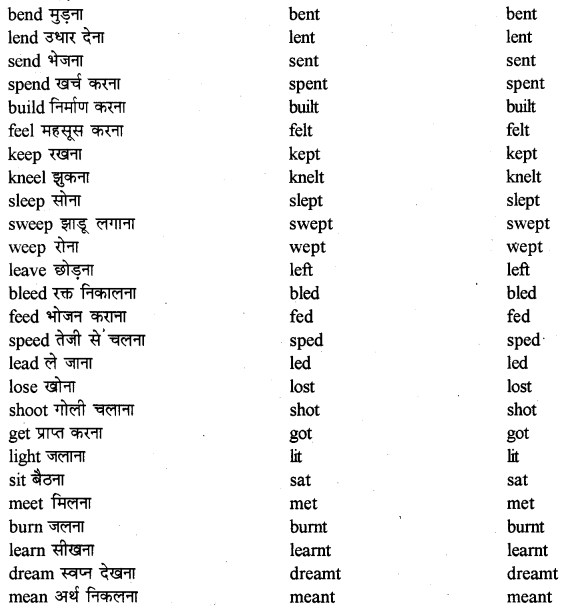
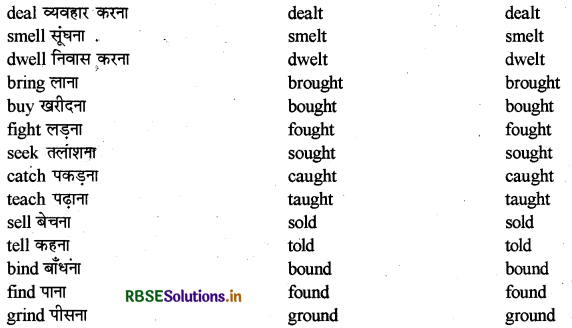
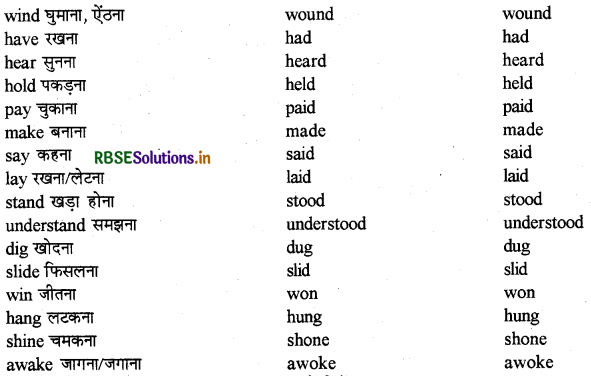
(iii) वे क्रियाएँ जिनकी तीनों Form अलग-अलग होती हैं
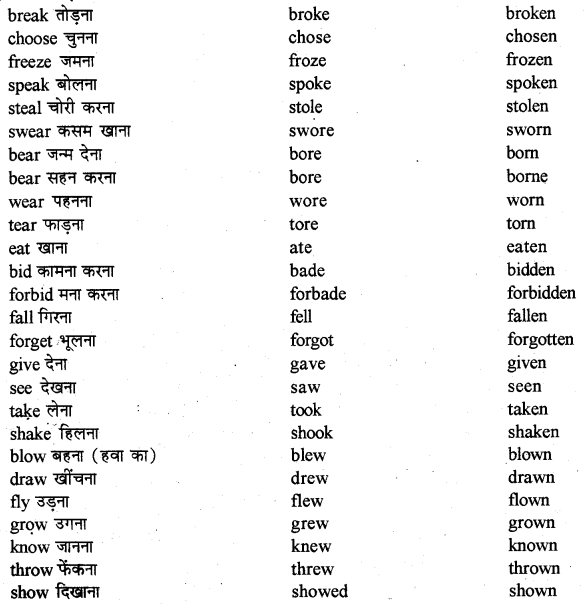
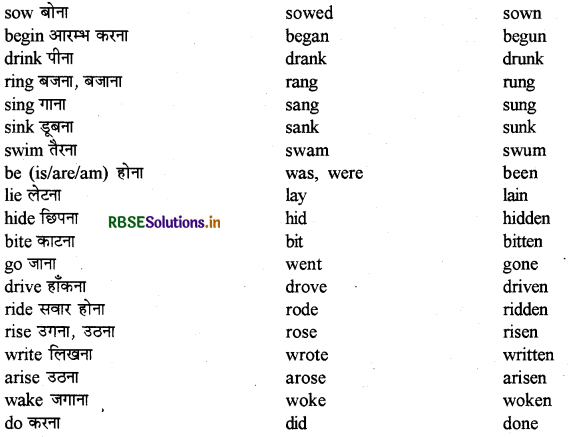
6. Kinds of Tenses :
Modern English में Tense दो प्रकार के होते हैं
1. Present Tense
2. Past Tense
इन Tenses के चार - चार भेद है
1. Indefinite/Simple
2. Continuous/Progressive
3. Perfect
4. Perfect Continuous/Progressive
“There is no Future Tense in Modern English.” - A.J. Thomson & A.V. Martin

Future Action को show करने के लिए निम्न forms हैं
1. The future simple
2. The future continuous
3. The future perfect
4. The future perfect continuous
5. The simple present
6. The present continuous
7. The "be going to'form
8. Will + infinitive, used for intention
I. Present Tense
1. Simple Present Tense
(A) Affirmative Sentences : साधारण वाक्य
Sentence Structure : वाक्य संरचना
Subject (कर्ता) + Verb (क्रिया) + Object (कर्म) / + Adverb(s) (क्रिया-विशेषण)
Examples : उदाहरण
1. मैं घर जल्दी लौटता हूँ।
I return home early.
2. श्याम के सहपाठी सम्मान से उसकी ओर देखते हैं।
Shyam's classmates look at him with respect.
3. लेखक भारतीय समाज की तस्वीर पेश करता है।
The writer present s the picture of the Indian society.
4. सिपाही, सेंधमार को पकड़ता है।
The policeman catches the house breaker.
5. श्याम के माता-पिता अच्छे हैं।
Shyam's parents are good.
6. दादी, श्याम से प्रेम रखती है।
Granny has love for Shyam.
Rules : नियम -
(i) हमेशा verb की first form, प्रयोग करें। देखें वाक्य संख्या 1 से 6 तक।
(ii) यदि वाक्य का Subject, Third Person Singular (He, She, It या name of one person or thing) है तो Verb की I form के अन्त में 's' या 'es' लगायें। देखें वाक्य संख्या 3 व 4.
(iii) यदि verb का अन्तिम अक्षर o, x, sh, ch, ss हो तो 'es' का प्रयोग करें। शेष सभी Verbs के साथ 's' का प्रयोग करें। देखें वाक्य संख्या 4.
(iv) यदि क्रिया 'स्थिति' (state) बता रही हो तो is/are/am का प्रयोग करें व 'स्वामित्व' (possession) के लिए has/have का प्रयोग करें। देखें वाक्य संख्या 5 व 6.
(B) Negative Sentences : (नकारात्मक वाक्य)
Sentence Structure : (वाक्य संरचना)
S + do/does + not + V-I + 0 + Adv.
Examples : उदाहरण
1. मैं अंधेरा पसन्द नहीं करता
I do not like darkness.
2. सहपाठी अब श्याम का निरादर नहीं करते हैं।
Classmates do not disrespect Shyam now.
3. पिता, श्याम को प्यार नहीं करते हैं।
Father does not love Shyam.
Rules : नियम -
(i) यदि sentence का subject (कर्ता) Third Person Singular (He, She, It या name of one person or thing) है तो does सहायक क्रिया (Helping Verb) का use करें। देखें । वाक्य संख्या 3.
(ii) यदि sentence का subject (कर्ता) First Person (I, We) या Second Person (You) या Plural (बहुवचन) है तो do सहायक क्रिया (Helping Verb) का use करें। देखें वाक्य संख्या 1 व 2.
(iii) हमेशा verb की First Form का use करें। देखें वाक्य संख्या 1 से 3 तक।

(C) Interrogative Sentences : (प्रश्नवाचक वाक्य) (सहायक क्रिया वाले) .
Sentence Structure : (वाक्य संरचना)
H.V. (Do/Does) + S + V - I + O + Adv. ?
Examples : उदाहरण
1. क्या आप अपने वतन से प्रेम करते हैं ?
Do you love your country ?
2. क्या सहपाठी अब भी श्याम का आदर करते हैं ?
Do classmates respect Shyam till now ?
3. क्या पिता श्याम को लाड़-प्यार करते हैं ?
Does father love Shyam ?
Rules : नियम-
(i) Does का use (प्रयोग) Third Person Singular Subjects के साथ करें।
(ii) Do का प्रयोग Plural Subjects व I के साथ करें।
(iii) Verb की First Form का use करें।
(iv) वाक्य के अन्त में प्रश्नवाचक चिह्न का use करें।
(D) Interrogatives with 'Wh' words : 'Wh' शब्द से आरम्भ होने वाले प्रश्नवाचक वाक्य :
Sentence Structure : (वाक्य संरचना) 'Wh' + HV (do/does) + S + V-I + O + Adv. ?
What (क्या), Which (कौनसा), Who (कौन), Whose (किसका), Whom (किसे), Why (क्यों), When (कब), Where (कहाँ), How (कैसे)।
Examples : उदाहरण
1. आप क्या चाहते हैं ?
What do you want ?
2. उसे अब कौनसी पुस्तक की आवश्यकता है ?
Which book does she need now ?
3. जीवन में असफलताएँ कौन चाहता है ?
Who wants failures in life ?
नोट : 'सकारात्मक सूचना' वाले प्रश्नवाचक वाक्य में Who के पश्चात् H.V. का use नहीं होता है।
4. अब तुम्हें किसके मार्गदर्शन की आवश्यकता है ?
Whose guidance do you need now ?
नोट : Which व Whose के पश्चात् सामान्यतः noun (संज्ञा) का use होता है।
5. आप किससे मिलना चाहते हैं ?
Whom do you want to meet ?

Rules : नियम
(i) सर्वप्रथम Whword का use करें।
(ii) फिर, नियमानुसार do/docs का use करें।।
(iii) Sentence के end में sign of interrogation (?) का use करें।
(iv) Verb की first form का use करें।
(E) Negative-Interrogative Sentences : (नकारात्मक - प्रश्नवाचक वाक्य)
Sentence Structure : (वाक्य संरचना)
Don't Doesn't + Sub. + V - I + O + adv.?
or
'Wh' word + don't/doesn't + S + V - I + O+ adv. ?
Examples : उदाहरण
1. क्या आप अपने वतन से प्रेम नहीं करते हैं ?
Don't you love your country ?
2. वह अब अपने माता-पिता का आदर क्यों नहीं करता है ?
Why doesn't he respect his parents now ?
(F) Use : (प्रयोग)
(i) With Habitual/Regular actions : आदतन/नियमित कार्य
1. श्याम प्रतिदिन अपनी दादी के पास सोता है।
Shyam sleeps daily with his granny.
2. प्रकृति बसन्त में आकर्षक रूप ग्रहण कर लेती है।
Nature wears a good look in spring.
3. पक्षी आकाश में उड़ते हैं।
Birds fly in the sky.
(ii) With Universal Truth : सार्वभौम सत्य
1. पृथ्वी सूर्य के चारों ओर घूमती है।
The earth moves round the sun.
(iii) With future planned programmes : भावी नियोजित कार्यक्रम
1. प्रधानमन्त्री कल जयपुर आएंगे।
The Prime Minister visits Jaipur tomorrow. [Impersonal/Part of a plan]
2. मेरे पिता अगले माह सेवानिवृत्त होंगे।
My father retires next month. [Formal-plan/arrangement]
3. अभिनेत्री कल उदयपुर पहुंचेगी, फिल्म स्टूडियो का उद्घाटन करेगी व उस ही दिन वापस चली जायेगी।
The actress reaches Udaipur tomorrow, inaugurates the film studio and goes back the same day. [a series of proposed future actions]

4. वह आपकी पुस्तक लौटा देगा जैसे ही वह इसे पूरी कर लेगा।
He will return your book as soon as he finishes it. [Time Clause]
(iv) With inherent qualities : जन्मजात गुण
1. माँ अपने बच्चों से प्रेम करती है।
A mother loves her children.
(v) With Scientific or Spiritual or other Principles and theories : वैज्ञानिक या आध्यात्मिक या अन्य सिद्धान्तों के साथ
1. जल में हाइड्रोजन व ऑक्सीजन होता है।
Water contains hydrogen and oxygen.
2. ईश्वर जन्म नहीं लेते हैं।
God doesn't take birth.
3. एक वर्ग के चार भुजाएँ होती हैं।
A square has four sides.
(vi) With quotations, proverbs etc. : कथन, कहावतें आदि
1. गाँधी कहते हैं, 'अहिंसा सर्वोच्च गुण है।'
Gandhi says, 'Non-violence is the supreme virtue.'
2. सभी चीज जो चमकती है, सोना नहीं होती है।
All that glitters, is not gold.

(vii) In Newspaper Headlines : समाचार-पत्र की सुर्खियाँ
1. प्रदूषण ने बीमारियाँ बढ़ाई।
Pollution increases ailments.
2. सरकार ने प्राइवेट कॉलोनियों को नियमित करने का फैसला किया : मुख्यमन्त्री
Govt: decides to regularize the private colonies : Chief Minister
(viii) In running commentaries : आँखों देखा हाल सुनाने में
1. गेंदबाज ने गेंद फेंकी, किन्तु बल्लेबाज ने एक चौका मारा।
The bowler bowls but the batsman hits a four.
(ix) To narrate past events effectively (historic present): भूतकाल की घटनाओं का प्रभावी वणेन करने के लिए
1. उस फिल्म में, विलेन ने हीरो को मारा, किन्तु उसने अपनी रक्षा की।
In that film, the villain hits the hero, but he defends himself.
2. भारत ने 1947 में स्वतन्त्रता प्राप्त की।
India wins freedom in 1947. :
(x) With Verbs of perception : अवबोधनात्मक क्रियाओं के साथ
(notice, see, watch, feel, hear, smell, taste etc.)
1. क्या आपको अन्तरात्मा की चुभन महसूस हो रही है
Do you feel the pricks of conscience ?
2. मैं आपकी आँखे मे प्रेम देख रहा हूँ
I notice love in your eyes.
(xi) With verbs of cognition (knowing) : संज्ञानात्मक क्रिया ओं के साथ
(know, suppose, remember, forget, believe, mean, think, understand, trust)
1. क्या आप भाग्य में विशवास करते है
Do you believe in fate?

(xii) With verbs of emotion : भावनात्मक क्रियाओं के साथ
(love, hate, anger, fear, desire, hope, like, want, wish, mind, prefer)
1. मैं अच्छे परिणाम की आशा कर रहा हूँ
I hope for the best result.
2. वह मुझे बहुत प्रेम करती हूँ
She loves me much.
(xiii) With some miscellaneous verbs : अन्य विविध क्रियाओं के साय
(appear, seem, resemble, matter, consist of, contain, deserve)
1. वह एक अभिनेत्री लग रही है
She appears to be an actress.
2. जग में दूध है
The jug contains milk.
(xiv) With Conditional-Imperative : (सशर्त - आदेशात्मक)
1. कठिन परिश्रम करें यदि आप सफलता चाहते है
Work hard if you want success.
2. खड़े हो जाना जब शिक्षक कक्षा में आये।
Stand up when the teacher comes to class.
(xv) Negative Imperative : नकारात्मक-आदेशात्मक
1. शोर न करें
Don't make a noise.
Exercise 1.
Rewrite the following sentences using correct forms of verbs given in brackets :
1. He always..........his will. (will = वसीपतानामा) (change)
2. The minister..........in Ajmer at 3 p.m. on Sunday. (arrive)
3. Cuckoos..........nests. (not make)
4. The earth..........round the sun. (move)
5. Bad students never.........hard. (work)
6. Stand up when the Principal..........to the lecture theatre. (come)
7. Water..........at 100°C. (boil)
8. The annual examination..........next week. (start)
9. My mother usually..........up before me. (wake)
10. We..........to school on Sundays. (not go)
11. The doctor..........the patient every day. (visit)
12. Rohit always..........in the evening. (play)
13. A teacher is a person who ..........student. (teach)
14. Our principal.......... disciplined students. (praise)
15. An advocate is a person who ..........case in a court. (argue)
Answer:
1. changes (यह वाक्य habitual action बता रहा है।)
2. arrives (यह वाक्य definite planned action of future बता रहा है।)
3. do not make (यह वाक्य inherent qualities बता रहा
4. moves (यह वाक्य alors universal truth an बता रहा है)
5. work (universal truth)
6. comes (यह वाक्य conditional-imperative है।)
7. boils (यह वाक्य scientific fact बता रहा है।)
8. starts (96 alope definite planned action of future at रहा है)
9. wakes (habitual action)
10. do not go (habitual/regular action)
11. visits (regular action)
12. plays (habitual action)
13. teaches (universal truth)
14. praises (habitual action)
15. argues (universal truth)

Exercise 2.
Supply correct forms of verbs given in brackets using Simple Present Tense :
1. In Rajasthan we usually.......rain in July. (have)
2. Farmers..........ploughing with pre-monsoon rain. (start)
3. They..........for the rain. (wait)
4. When it..........in time, they get nervous. (not come)
5. People..........drinking water. (not get)
6. Famines and droughts..........common in Rajasthan.
Answer:
1. have [यह वाक्य state (स्थिति) बता रहा है।]
2. start (regular action)
3. wait (regular action)
4. does not come (general statement)
5. do not get (regular action)
6. are (यह वाक्य state बता रहा है।)
2. Present Progressive/Continuous Tense
(A) Affirmative Sentences : साधारण वाक्य
Sentence Structure (वाक्य संरचना) : S + HV + (-ing form) + O + adv.
1. अमृतादेवी का बलिदान लोगों को प्रेरित कर रहा है।
Amritadevi's sacrifice is inspiring people.
2. बिश्नोई आज भी 29 सिद्धान्तों का पालन कर रहे हैं।
Bishnois are following the 29 tenets even today.
3. मैं वृक्षों के संरक्षण का निवेदन कर रहा हूँ।
I am pleading for the preservation of trees.
Rules : नियम -
(i) हमेशा verb की ing form का use करें। देखें वाक्य 1 से 3 तक।
(ii) Helping Verb (सहायक क्रिया) is का use (प्रयोग) Singular subjects (एकवचन कर्ता) के साथ करें। देखें वाक्य संख्या एक।
(iii) Helping Verb, 'are' का use plural subjects (बहुवचन कर्ता) के साथ करें। देखें वाक्य संख्या
(iv) Helping Verb, 'am' का use (प्रयोग) I' के साथ करें। देखें वाक्य संख्या 3.
(B) Negative Sentences : नकारात्मक वाक्य
Sentence Structure (वाक्य संरचना) : S + HV + not + V (ing form) + O + adv.
1. बिश्नोई हरे वृक्ष नहीं काट रहे हैं।
Bishnois are not hacking green trees.
नोट : इन वाक्यों में H.V. के बाद केवल not का use करना है। शेष नियम उपर्युक्तानुसार रखें।

(C) Interrogative Sentences : प्रश्नवाचक वाक्य .
Sentence Structure : वाक्य संरचना HV + S + V (-ing form) + O + adv.?
Or.
'Wh' word + HV + S + V + O + adv.?
1. क्या लोग बिश्नोइयों से प्रेरणा प्राप्त कर रहे हैं ?
Are people getting inspiration from Bishnois ?
2. लोग हरे वृक्ष क्यों काट रहे हैं ?
Why are people hacking green trees ?
(D) Negative-Interrogative Sentences : नकारात्मक-प्रश्नवाचक वाक्य
Sentence Structure : वाक्य संरचना
'Wh' word + HV + n't + S + V (-ing form) + O + adv. ?
Or
HV + n't + S + V+ O + adv. ?
1. क्या इन दिनों मैं आपकी सहायता नहीं कर रहा हूँ?
Ain't (am not) I helping you these days?
2. वह क्या नहीं कर रहा है?
What isn't he doing ?
(E) Use : प्रयोग
(i) Actions, continue at the time of speaking. (उन कार्यों के साथ जो बोलते वक्त जारी हैं।)
वह इस समय समाचार सुन रही है।
She is listening to the news at this time.
(ii) Actions, continue presently. (कार्य जो बोलते वक्त तो नहीं किन्तु वर्तमान में जारी हैं।)
मैं इन दिनों एक पुस्तक लिख रहा हूँ।
I am writing a book these days.
(iii) Definite planned action in near future. (नजदीक भविष्य का नियोजित कार्य।)
वे अगले सोमवार को आएंगे।
They are coming on next Monday.
(iv) When the following verbs indicate change of present state/situation.
(परिस्थिति परिवर्तन की सूचना के लिए)
(become, turn, get, go, grow, take etc.)
जल धीरे-धीरे बर्फ में परिवर्तित हो रहा है।
Water is slowly turning into ice.

(v) With 'always'; chiefly in the affirmative; for a frequently repeated action which annoys
the speaker. शब्द 'always' के साथ; मुख्य रूप से साधारण वाक्य में; बारंबारता वाला कार्य जो वक्ता की चिड़चिड़ाहट दर्शा रहा हो। वह हमेशा शिकायत करता रहता है।
He is always complaining.
मैं वह त्रुटि हमेशा करता रहता हूँ।
Iam always making that mistake
Exercise 3.
Rewrite the following sentences using correct forms of verbs given in brackets in Present Continuous Tense :
1. Listen ! Someone to open the gate. (try)
2. Students computer and information technology these days. (learn)
3. We a cricket match at this moment. (watch)
4. I a coat today because the sun is not shining. (wear)
5. She exercises on tenses now. (do)
6. Mrs. Mathur her fiftieth wedding anniversary next week. (celebrate)
7. They. wedding preparations today. (make)
8. Ravi money to buy a new car. (save)
9. The prices of essential commodities day by day. (rise)
10. Towns into cities these days. (change)
Answer:
1. is trying [इस वाक्य में at the time of speaking (बोलते वक्त) action (कार्य) जारी है।]
2. are learning (कार्य नतिमान में जारी है, continue presently)
3. are watching (action, continue at the time of speaking) बोलते क्त कार्य जारी है
4. am wearing (action, continue at the time of speaking)
5. is doing (action continue at the time of speaking)
6. is celebrating (definite planned action in near future) नजदीक भविष्य का नियोजित कार्य
7. are making (action continue at the time of speaking)
8. is saving (action continue presently) कार्य वर्तमान में जारी है
9. are rising (action continue presently)
10. are changing (action continue presently)
Exercise 4.
Supply the correct forms of verbs given in brackets using Present Simple Present Continuous form of the verb :
1. Nature us each and everything. (give)
2. It can the man’s needs not his greed. (Will)
3. Trees rains. (attract)
4. Fertile land into barren land for want of trees. (turn)
5. Rainy water away the upper part of land. (wash)
6. Every year govt ‘Van-Mahotsava Day’. V (celebrate)
7. Now people very cautious against the danger that is likely to overtake us. (get)
Answer:
1. gives (regular action)
2. fulfil [modal (can) के बाद bare infinitive (verb के I - form) का use होता है।]
3. attract (इस वाक्य में scientific fact है)
4. turns (scientific fact)
5. washes (universal truth/scientific fact)
6. celebrates (regular action)
7. are getting (action continue presently)

3. Present Perfect Tense
(A) Affirmative Sentences : साधारण वाक्य
Sentence Structure (वाक्य संरचना) :
S + HV + V-III + O + adv.
1. मैंने जूतों की दुकान में बहुत कुछ सीखा है।
I have learnt a lot at the shoe store.
2. हम उस चिड़ियाघर को देख चुके हैं।
We have seen that zoo.
3. उसने अपने अच्छे दाएँ हाथ में विश्वास रखा है।
He has believed in his good right hand.

Rules (नियम) :
(i) सहायक क्रिया has का प्रयोग Third Person Singular Subjects के साथ करें।
(ii) सहायक क्रिया have का प्रयोग I व Plural (बहुवचन) Subjects के साथ करें।
(iii) Verb की Past Participle Form (III Form) का use करें।
(B) Negative Sentences : नकारात्मक वाक्य
Sentence Structure (वाक्य संरचना) :
S + HV + not + V-III + O + adv.
1. हंसिनी रानी ने वृद्ध दम्पति को नुकसान नहीं पहँचाया है।
The swan queen has not harmed the old couple.
(C) Interrogative Sentences : प्रश्नवाचक वाक्य Sentence Structure (वाक्य संरचना) : HV + S + V-III + O+ adv. ?
Or 'Wh' word + HV + S + V-III + O + adv. ?
1. क्या आपने अपने पाठ याद कर लिए हैं?
Have you learnt your lessons?
2. ऊँट को अपना हम्प कैसे प्राप्त हुआ है ?
How has the camel got its hump?
(D) Negative-Interrogative Sentences : नकारात्मक-प्रश्नवाचक वाक्य
Sentence Structure : (वाक्य संरचना) : HV-n't + S + V-III + O + adv. ?
Or 'Wh' word + HV-n't + S + V-III + O + adv. ?
1. क्या डॉक्टर पी.के. सेठी ने जयपुर-फुट नहीं दिया है ? .
Hasn't Dr. P.K. Sethi given Jaipur-foot ?
2. आपने मिनरल वॉटर क्यों नहीं पीया है?
Why haven't you drunk mineral water?

(E) Use : प्रयोग
(i) With an action completed in the recent past and has its effect in the present.
ऐसे कार्य के साथ जो पूरा हो चुका है और वर्तमान में भी इसका प्रभाव है।
1. मैंने पहले ही अपना पाठ याद कर लिया है।
I have already learnt my lesson.
वर्तमान प्रभाव अब मुझे पाठ याद करने की आवश्यकता नहीं है।
2. बिश्नोइयों ने लम्बे समय से हरे वृक्षों की रक्षा की है।
Bishnois have protected green trees for a long time.
3. वह सोमवार से कक्षा में उपस्थित नहीं हुआ है।
He has not attended classes since Monday.
(ii) In adverb clause of time when the main clause is in future tense.
जब मुख्य क्लउज future tense में हो तो adverb clause of time में इस tense का use करें।
1. हम यहाँ तब तक रुकेंगे जब तक कि शिक्षक वापस न आ जाए।
We shall stay here till the teacher has returned.
2. जब गर्मी कम हो जायेगी, मैं बाहर जाऊँगा।
When the heat has lessened, I shall go out.
(iii) With repeated actions (बारंबारता वाले कार्य में)
हम उदयपुर की यात्रा अनेक बार कर चुके हैं। .
We have visited Udaipur lots of times.
(iv) To denote 'state'. ('स्थिति' बताने के लिए) मैं आपके बारे में हमेशा जानता रहा हूँ। ...
I have always known about you.
(v) With 'since' and 'for' (since व for के साथ)
'Since' is used for 'point of time' and 'for' is used for period of time'.

1. मैं 10 घंटे पढ़ चुका हूँ। -
I have studied for ten hours.
2. मैं सुबह 10 बजे से खेलता रह चुका (अब 3 बज चुके) .
I have played since 10 in the morning.
Exercise 5.
Rewrite the following sentences using the correct forms of the verb given in brackets :
1. Someone him to report for duty. (inform)
2. You already her. (meet)
3. You ever ‘War and Peace’ ? (read)
4. She four cups of tea so far. (rake)
5. I see you just your hair cut. (have)
6. She already the bell twice. (ring)
7. I her since Monday. (not see)
8. Anu from Ajmer yet. (not return)
9. Neetu is looking for mushrooms but she any. (not find)
10. We are tired. We ten kilometers. (walk)
Answer:
1. has informed (कार्य recent past में पूरा हुआ है और वर्तमान में इसका प्रभाव पड़ रहा है।)
2. have met (already' adverb है अतः अक्सर इस tense का use करते हैं।)
3. have read (ever' adverb के साथ अक्सर इस tense का use करते हैं।)
4. has taken ('so far' adverb के साथ अक्सर इस tense का use करते हैं)
5. have had (“just adverb)
6. has rung already' adverb)
7. have not seen (since + time a recent past करते हैं)
8. has not returned (“yet' adverb)
9. has not found (but conjunction हैं recent past करते हैं)
10. have walked (recent past का action हैं)
4. Present Perfect Progressive Tense
(A) Affirmative Sentences : साधारण वाक्य
Sentence Structure : वाक्य संरचना
s+ HV (has been/have been) +V-ing + O+ since/for + time.
1. वह बचपन से सितार बजा रही है।
She has been playing Sitar since childhood.
2. वे वर्षों से संगीत को समृद्ध कर रहे हैं।
They have been enriching music for years.

Rules (नियम) :
(i) हमेशा क्रिया की ing-form का use करें।
(ii) सहायक क्रिया (Helping verb) has been का use, Third Person Singular Subjects के साथ करें व have been का use, I व Plural Subjects के साथ करें।
(iii) Preposition 'since' का प्रयोग point of time (निश्चित समय) के साथ करें, जैसे
since 3 o'clock -- (घड़ी का समय)
since Monday -- (दिन का नाम)
since 10 March -- (दिन व तारीख)
since July -- (महीने का नाम)
since 1990. -- (सन्)
since morning
since evening
since night (since last night)
since noon
since yesterday
since last (week, month) -- लेकिन for the last (week, month)
since birth -- (जन्म से)
since (he came) -- जबसे (वह आया है)
since (he went) -- जबसे (वह गया है)
(iv) Preposition for' का use period of time (समयावधि) के साथ करें, जैसे
तीन घण्टे -- से for three hours -- (घण्टे)
दो सप्ताह -- से for two weeks -- (सप्ताह)
सात महीने -- से for seven months -- (महीने)
दो वर्षों से -- for two years -- (वर्ष)
(B) Negative Sentences : नकारात्मक वाक्य
Sentence Structure : वाक्य संरचना S + HV (has not been/have not been) + V-ing + O + since/for+time

1. मैं वर्षों से फिल्म नहीं देख रहा हूँ।
I haven't been watching film for years.
2. कश्मीर घाटी में 1947 से ही रेलगाड़ी नहीं चल रही है।
Train has not been plying in Kashmir valley since 1947.
नोट : not का use, been से पहले करें। शेष नियम उपर्युक्तानुसार।
(C) Interrogative Sentences : प्रश्नवाचक वाक्य
Sentence Structure : वाक्य संरचना Has/Have + S + been + V-ing + O + since/for + time?
Or
'Wh' word + has/have + S + been + V-ing + O + since/for+time ?
1. क्या वह वर्षों से नृत्य का प्रशिक्षण प्राप्त कर रही है?
Has she been receiving the training of dance for years?
2. आतंकवादी वर्षों से हिंसा क्यों फैला रहे हैं ?
Why have terrorists been spreading violence for years?
(D) Negative-Interrogative Sentences : नकारात्मक-प्रश्नात्मक वाक्य
Sentence Structure : वाक्य संरचना Hasn't/Haven't + S + been + V-ing + O + since/for + time?
Or.
'Wh' word + hasn't/haven't + S + been + V-ing + O + since/forttime?

1. क्या अमीर वर्षों से गरीबों का शोषण नहीं कर रहे हैं ?
Haven't the rich been exploiting the poor for years ?
2. सभी विद्यार्थी जुलाई से ही कठिन परिश्रम क्यों नहीं कर रहे हैं ?
Why haven't all the students been working hard since July ?
(E) Use : प्रयोग
(i) With an action began sometime in the past and is still continue.
ऐसे कार्य के साथ जो भूतकाल में किसी समय आरम्भ हुआ और अभी भी जारी है।
1. वे साधु आधे घण्टे से भजन गा रहे हैं ।
Those saints have been singing hymns for half an hour.
2. आप कब से बीमारी से ग्रसित हो रहे हैं ?
Since when have you been suffering from the disease ?
(ii) With the actions being repeated by now.
अब तक repeat किए जा रहे actions के साथ।
(iii) वह उदास दिख रही है हाँ वह रोती रही है
She looks sad : Yes, she has been weeping.
Exercise 6.
Supply the correct forms of the verb given in brackets using Present Perfect Continuous Tense :
1. They..........a bridge for over a year and it still isn't finished. (build)
2. She..........computer for six months and she hasn't learnt much yet. (learn)
3. The children.........all the afternoon.(sleep)
4. The pipe.........for ages. We must get it repaired.(leak)
5. I.......... sausage rolls for the party all the morning.(make)
6. We..........about it for two hours.(discuss)
7. The radio..........since 7 a.m. I wish someone could switch it off.(play)
8. I..........with him for ten years and he has never greeted me. .(work)
9. I am sorry to keep you waiting, I..........to make a telephone call to Mumbai : for sometime. (try)
10. Her telephone..........for ten minutes, I wonder why she doesn't answer it. (ring)
Answer:
1. have been building (वाक्य for + time व Perf. Cont. की sense है)
2. has been learning (for + time व Perf. Cont. की sense है)
3. have been sleeping (all + time व Perf. Cont. की sense है)
4. has been leaking (for + time व Perf. Cont. की sense है)
5. have been making (all + time व Perf. Cont. की sense है)
6. have been discussing (for + time व Perf. Cont. की sense है)
7. has been playing (since + time व Perf. Cont. की sense है)
8. have been working (for + time व Perf. Cont. की sense है)
9. have been trying (for + time व Perf. Cont. की sense है)
10. has been ringing (for + time व Perf. Cont. की sense है)
II. Past Tense
5. Simple Past Tense
(A) Affirmative Sentences : साधारण वाक्य
S+ V-II + O+ adv.
1. प्रत्येक ग्राहक ने जूतों की कई जोड़ियाँ खरीदीं।
Each customer bought several pairs of shoes.
2. लेखक ने उस शू-स्टोर में कदम रखा।
The narrator stepped into that shoe-store.
Rules (नियम) :
(i) साधारण वाक्यों में हमेशा verb की second form का use करें।
(ii) उपर्युक्त sentence structure के अनुसार वाक्य बनाएँ।

(B) Negative Sentences : नकारात्मक वाक्य
Sentence Structure : (वाक्य संरचना) :
S + HV (did) + not + V-I + O + adv.
1. विक्रयकर्ता ने व्यावसायिक कौशल नहीं दिखाया।
The salesman did not display professional skills.
Rules (नियम) :
(i) सभी subjects के पश्चात् helping verb (सहायक क्रिया) did का use करें।
(ii) सभी negative sentences में verb की first form का use करें।
(iii) Sentence Structure का अनुसरण करें।
(C) Interrogative Sentences : प्रश्नवाचक वाक्य
Sentence Structure : (वाक्य संरचना)
HV (Did) + S + V-I + 0 + adv.
1. क्या सिपाही ने सेंधमार को पकड़ा?
Did the policeman catch the house-breaker ?
किसने एक नैतिक समस्या से संघर्ष किया ?
2. Who struggled with an ethical problem?
नोट : Positive-interrogative में who के बाद verb की II form का use करें।
3. राजा, खेजड़ली गाँव कब आया ?
When did the king come to Khejadali village ?
(D) Negative-Interrogative Sentences : नकारात्मक-प्रश्नवाचक वाक्य
Sentence Structure : (वाक्य संरचना) :
Didn't + S + V-I + O + adv. ?
Or
Wh' word + didn't + S + V-I + O + adv. ?
1. क्या श्रीमान् हिल ने विक्रयकर्ता की सहायता नहीं की ?
Didn't Mt. Hill help the salesman ?
2. किसने उत्तर नहीं दिया?
Who didn't give the answer?'
नोट : Who वाले वाक्यों में subject का use नहीं होता है।
3. वह सत्य क्यों नहीं बोली? ।
Why didn't she speak the truth?

(E) Use : प्रयोग
(i) With past actions when the time of an action is mentioned or implied.
ऐसे past actions के साथ जिसमें कार्य का समय या तो बताया गया है या निहित है।
नोट : ago, yesterday, last, previous आदि adverbs का use हो सकता है।
1. गाँधीजी ने काफी वर्ष पहले प्रार्थना पर प्रवचन दिया।
Gandhiji gave a discourse on prayer many years ago.
2. हंसिनी रानी ने अपने पुत्र को अनाथ नहीं छोड़ा।
The swan queen did not leave her son orphan.
3. श्याम के पिता ने वह समाचार कल क्यों बताया ?
Why did Shyam's father tell the news yesterday ?
(ii) In 'improbable conditional sentences' :
असम्भाव्यता - शर्त वाले वाक्यों में :
1. यदि तुम परिश्रम करते तो तुम सफल हो जाते।
If you worked hard, you would pass.
2. काश, मैं पक्षी होता, तो मैं उड़ता।
Were I a bird, I would fly.
(iii) Use was/were to denote a 'state'.
स्थिति बताने को was/were का प्रयोग करें।
1. वह सोया हुआ था।
He was asleep.

(iv) With Past Habit' by used to'
“Used to' के साथ भूतकाल की आदत बताने के लिए।
मै तब तैरा करता था
I then used to swim.
Exercise 7.
Supply the correct form of verb in Past Simple Tense in the following sentences:
1. Last year the government..........a new legislation to check pollution. (introduce)
2. I..........the bus leaving a few minutes ago. (see)
3. The water in the pond..........last night. (freeze)
4. They..........back very late last night. (get)
5. When ...........here first time, it was quite a lonely area. (come)
6. Yesterday I........you twice but........ no response. (ring, get)
7. India..........freedom in 1947. (get)
8. I..........that you.........here. (not know, be)
9. Where..........you.......this knife? (find)
10. Yesterday I.......... home at 8 a.m. and..........back at 12 noon, (leave, get)
Answer:
1. introduced (वाक्य मे adverb, last year आई है )
2. saw (ago आया है)
3. froze (last night आया है)
4. got (last night आया है)
5. came (time clause, when से शुरू है व इसमें action,simple past है)
6. rang, got (yesterday आया है)
7. got (1947, past time है)
8. did not know, were (वाक्य की sense, simple past की है तथा be की II form, was/were होती है।)
9. did, find (प्रश्नवाचक वाक्य की sense, simple past की है।)
10. left, got (yesterday आया है।)
6. Past Progressive/Continuous Tense
(A) Affirmative Sentences : साधारण वाक्य
Sentence Structure : (वाक्या संरचना)
S + HV (was/were) + V-ing + O + adv.
1. मैं शु - स्टोर में उन दिनों बहुत कुछ सीख रहा था |
I was learning much in the shoe-store those days.
2. वे उस समय प्रार्थना के बारे में सीख रहे थे
They were learning about the prayer at that time.
Rules (नियम) :
(i) Helping verb, was का use, singular subjects के साय करों
(ii) Helping verb, were का use, plural subjects के साय करों
(iii) Verb + ing form का use करें।
(iv) उपर्युक्त sentence structure को follow करें।
(B) Negative. Sentence :
Sentence Structure :
S + HV + not + V-ing + O + adv.

1. वहा अपना समय व्यर्थ नहीं कर रही थी
She was not wasting her time.
Note: इन sentences में HV के बाद not का use करें, शेष नियम उपर्युक्तानुसार हैं। Sentence structure को follow करें।
(C) Interrogative Sentences : प्रशनवाचक वाक्य
Sentence Structure : (वाक्या संरचना)
HV + S + V-ing + O + adv. ?
Or
'Wh' word +HV + S + V-ing + O + adv.?
1. क्या वह भोजन कर रहा था?
Was he taking meal?
2. तुम शू-स्टोर में क्या सीख रहे थे ?
What were you learning in the shoestore ?
नोट : वाक्य बनाने के लिए sentence structure को follow करें।
(D)Negative-Interrogative Sentence : नकारात्मक-प्रश्नवाचक वाक्य
Sentence Structure : (वाक्य संरचना) : HV (Wasn't/Weren't) + Sub. + V-ing. + O + adv.?
Or
'Wh' word + HV (wasn't/weren't) + Sub. + V-ing + O + adv. ?
1. क्या विद्यार्थी प्रार्थना के बारे में नहीं सीख रहे थे ?
Weren't the students learning about the prayer ?
2. स्वामी अकेला क्यों नहीं सो रहा था ?
Why wasn't Swami sleeping alone ?

(E) Use : प्रयोग
(i) To indicate past actions that were continued some time in the past.
ऐसे past actions के लिए जो भूतकाल में जारी थे।
1. रमेश उस समय विश्राम कर रहा था।
Ramesh was taking rest then.
(ii) To express the definite future arrangement of the past.
वह उस रात्रि रवाना हो रहा था।
He was leaving that night.
(iii) With always; for a repeated action
शब्द always के साथ; बारंबार वाले कार्य के लिए
वह हमेशा काम करती रहती थी।
She was always working.
Exercise 8.
Supply the correct tense Past Simple or Past Continuous form of the verb given in brackets and rewrite the sentences:
1. When I....... her first time, she........in a cafe. (see, sit)
2. I..........my leg while I.........how to drive a scooter. (hurt, learn)
3. He..............a shock while he............a fuse. (get, mend)
4. They...........us to go in the boat yesterday as a strong wind...........(not allow, blow)
5. She.......to her neighbour when the baby.........to cry. (talk, begin)
6. Malti.........her finger, while she....... vegetable. (hurt, cut)
7. When I........to see him, he......a cricket match on T.V. (go, watch)
8. He..........aśleep when he.........in a train.(fall, travel)
9. My father............the plants when suddenly the rain.........(water, start)
10. He......... under a bridge when the storm........out.(run, break)
Answer:
1. saw, was sitting (first time, simple past को इंगित कर रहा है व दूसरे clause मे sitting का कार्य जारी या)
2. hurt, was learning (main clause A simple past on sense a while act subordinate clause में अक्सर past progressive का use करें।)
3. got, was mending (उत्तर संख्या 2 वाली ही स्थिति है)
4. did not allow, was blowing (main clause में yesterday आया है व a subordinate clause as आया है)
5. was talking, began (main clause में talking of an art a subordinate clause when के बाद अक्सर simple past का use होता है)
6. hurt, was cutting (उत्तर संख्या 2 वाली ही स्थिति है)
7. went, was watching (उत्तर संख्या 5 वाली ही स्थिति है)
8. fell, was travelling (main clause में simple past at sense a subordinate clause के when के बाद past progressive की sense है।)
9. was watering, started (main clause में past progressive sense a subordinate clause में when के बाद अक्सर simple past आता है।)
10. was running, broke (उत्तर संख्या 9 वाली ही स्थिति है)
7. Past Perfect Tense
(A) Affirmative Sentences : साधारण वाक्य
Sentence Structure : (वाक्य संरचना)
S + HV (had) + V-III + O + adv.

Dr. P.K.'Sethi had invented Jaipur-foot by that time.
2. डॉक्टर के आने से पहले रोगी मर चुका था।
The patient had died before the doctor came.
3. गृहकार्य पूरा करने के बाद हम खेले।
After we had completed homework, we played...

Rules (नियम) :
(i) Helping Verb, had का use करें। -
(ii) Verb की III form का use करें।
(iii) यदि एक large sentence के दो उपवाक्य (clause) हों sentence structure के अनुसार वाक्य बनायें।
(B) Negative Sentences : नकारात्मक वाक्य
Sentence Structure : (वाक्य संरचना) :
S + HV + not + V-III + 0 + adv.
उसने तब तक पाठ का दोहरान नहीं किया था।
He had not revised the lesson by then.
(C) Interrogative Sentences : प्रश्नवाचक वाक्य
Sentence Structure : (वाक्य संरचना) :
HV + S + V-III + O + adv. ?
Or
'Wh' word + HV + S + V-III + O + adv.?
चोर ने अपने आपको क्यों बदल लिया था ?
Why had the thief changed himself ?
(D) Negative-Interrogative Sentences : नकारात्मक-प्रश्नवाचक वाक्य
Sentence Structure : (वाक्य संरचना) :
Hadn't + S + V-III + O + adv. ?
Or
Wh' word + hadn't + S + V-III + O + adv. ?
क्या बिश्नोइयों ने जीवन का बलिदान नहीं कर दिया था ?
Hadn't Bishnois sacrificed their lives?
(E) Use : प्रयोग
(1) To denote past actions occurred before another point in the past. भूतकाल के कार्य जो
किसी समय में पूर्ण हो चुके थे।
वे उस समय तक हरे वृक्षों को काट चुके थे।
They had cut the green trees by that time.
(i) To indicate an action that had completed before another started. दूसरे कार्य के आरम्भ से
पूर्व पहला पूर्ण हो चुका हो।
जब हम स्टेशन पहुंचे तो ट्रेन जा चुकी थी।
The train had departed when we reached the station.

(ii) In conditional sentences indicating 'impossible condition'.शर्त वाले वाक्यों में जो असंभव
शर्त को इंगित कर रहे हों।
यदि मैं कठिन परिश्रम करता तो मैं सफल हो चुका होता।
If I had worked hard, I would have passed.
Exercise 9.
Rewrite the following sentences using the appropriate form of verb given in brackets Past Simple or Past Perfect Tense.
1. I........to bed after I........my work. (go, finish)
2. Suddenly I........that I........some mistake. (realize, make)
3. The patient........before the doctor............ (die, arrive)
4. They.........me for what I..........for him. (thank, do)
5. On reaching the bank he..........that he........to bring the passbook. (remember, forget)
6. Before help..........us, one woman...........(reach, collapse)
7. She.........me his name after he........... (tell, leave)
8. When we........the cinema hall, the film already.........(enter, start)
9. He..........me after he............Delhi.(phone, reach)
10. Why......you........to the doctor after I..........you to ? (not go, tell)
Answer:
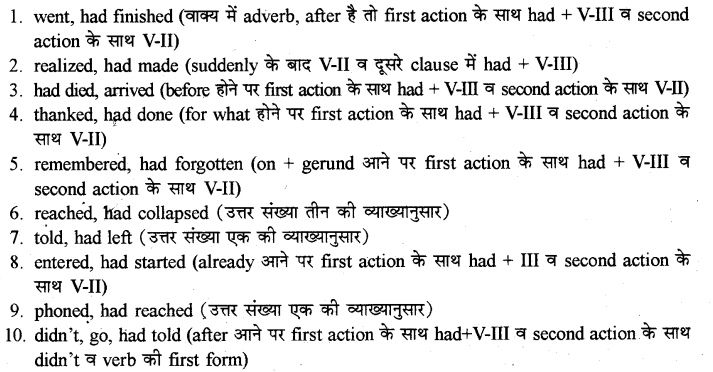

8. Past Perfect Continuous Tense
(A) Affirmative Sentence : साधारण वाक्य
Sentence Structure : (वाक्य संरचना) :
S + HV (had been) + V-ing + O + since/for + time
1. अध्यापक सोमवार से अंग्रेजी पढ़ा रहा था।
The teacher had been teaching English since Monday.
Rules (नियम) :
(i) Singular व Plural सभी subjects के साथ एक ही helping verb, had been का use करें।
(ii) since का use, point of time के साथ करें।
(iii) for का use, period of time के साथ करें।
(iv) क्रिया की V+ ing form का use करें।
(B)Negative Sentences : नकारात्मक वाक्य
Sentence Structure : (वाक्य संरचना) :
S+ hadn't been + V-ing + O + since/for + time.
1. बिश्नोई वर्षों से हरे वृक्ष नहीं काट रहे थे।
Bishnois hadn't been hacking green trees for years.
Note : had के बाद not का use करें व शेष नियम उपर्युक्तानुसार use करें।
(C) Interrogative Sentences : प्रश्नवाचक वाक्य
Sentence Structure : (वाक्य संरचना) :
Had+S+ been + V-ing +O+ since/for + time ?
Or
'Wh' word + had + S + been + V-ing +O+ since/for + time ?
1. बिश्नोई वर्षों से हरे वृक्षों की रक्षा क्यों कर रहे थे ?
Why had Bishnois been protecting green trees for years?
(D) Negative-Interrogative Sentences : नकारात्मक-प्रश्नवाचक वाक्य
Sentences Structure : (वाक्य संरचना) :
Hadn't + S + been + V-ing + O + since/for + time?
'Wh' word + hadn't + S + been + V-ing + O.+ since/for + time ?
1. क्या डॉ. पी. के. सेठी वर्षों से अनुसंधान नहीं कर रहे थे ?
Hadn't Dr. P.K. Sethi been doing research for years ?

(E) Use: प्रयोग
(i) With the action began before the time of speaking in the past, and continued upto that time, or stopped just before it.
उस कार्य के साथ जो भूतकाल में बोलने के समय से पहले आरंभ हुआ था और बोलने तक जारी था, या इसके कुछ समय पूर्व ही समाप्त हुआ था। वह उषाकाल से कार्य कर रही थी।
She had been working since dawn.
(i) A repeated action in the past perfect can sometimes be expressed by it.
Past Perfect के एक repeated action को इसके द्वारा व्यक्त किया जा सकता है
I had tried ten times to solve this question. (Past Perfect)
I had been trying to solve this question. (Past Perfect Continuous)
Exercise 10.
Supply the correct form of the verb given in brackets using Past Perfect
Continuous Tense :
1. The students ............ extra classes for a week because the syllabus was incomplete. (take)
2. As the player did not get out so she ........... since morning. (play)
3. She ........ TV. programmes for two hours because she had no work. (watch)
4. As I couldn’t revise my lessons earlier so I ........ those Since I last month. (revise)
5. She ............. the plants for ten minutes because those were dry. (water)
Answer:
1. had been taking
2. had been playing
3. had been watching
4. had been revising
5. had been watering.
III. Future Action
The Future Simple
(A) Affirmative Sentences : साधारण वाक्य
Sentence Structure : वाक्य संरचना
S + HV (will/shall) + V-I + O + adv.
1. मैं सुबह प्रार्थना करूंगा।
I shall offer prayer in the morning.
2. तुम ठाकुर के कुएं से पानी भरोगे।
You will fill water from the Thakur's well.
Rules : नियम
(i) Helping Verb, shall का use, या We, subjects के साथ करें।
(ii) Helping Verb, will का use शेष सभी subjects के साथ करें।
(iii) Verb की first form का use करें।

(B) Negative Sentences : नकारात्मक वाक्य
Sentence Structure : वाक्य संरचना
S+ HV + not + V-I +O+ adv.
1. हंसिनी रानी अपने पुत्र को अकेला नहीं छोड़ेगी।
The swan queen will not leave her son alone.
2. हम यात्रा के लिए कल रवाना नहीं होंगे।
We shall not leave for journey tomorrow.
(C) Interrogative Sentence : प्रश्नवाचक वाक्य
Sentence Structure : वाक्य संरचना
HV + S + V - I + O + adv. ?
Wh' word + HV + S + V - I + O + adv. ?
आप यह पुस्तक कब पढ़ेंगे?
When will you read this book?
(D) Negative-Interrogative Sentences :
Sentence Structure :
Shan't/Won't + S + V-I + O + adv. ?
Or
Wh' word + shan't/won't + S + V-I + O + adv. ?
क्या हम अपनी समझ नहीं बढ़ायेंगे ?
Shan't we grow our understanding ?
(E) Use : प्रयोग .
(i) To express 'pure future'
भविष्य के कार्य की सूचना के लिए मैं वहाँ जाऊँगा।
I shall go there.
(i) Shall I या Shall we का use किसी की wishes (इच्छा) या instructions (निर्देश) जानने के लिए करें।
1. क्या मैं दरवाजा खोल लँ?
Shall I open the door ?
(किसी की wish जानना)
2. क्या हम लिखना प्रारम्भ करें?
Shall we start writing ?
(किसी से निर्देश लेना)

(iii) In conditional sentences expressing open/probable condition.
शर्त वाले वाक्य जो भावी संभावना प्रकट करते हैं।
यदि आप निवेदन करेंगे तो,(Subordinate Clause) मैं आपकी सहायता करूँगा। (Main Clause)
Note : Simple Future of use, main clause a subordinate clause Simple Present का use करें।
(iv) Future + Time Clause in Present Tense
मैं बाजार के लिए तब रवाना होऊँगा जब वह मेरे साथ होगी।
I'll leave (Future) for market when she accompanies me.(Time Clause)
Exercise 11.
Fill in the blanks with the correct forms of the verbs given in brackets with Simple Future Tense :
1. He .................. back my amount the next week. (pay)
2. The police .................. very’ strict in future. (be)
3. She .................. another concert this year. (give)
4. I think it .................. before it gets dark, (rain)
5. They .................. a new bridge across the river. (build)
6. They .................. a new legislation next week. introduce)
7. We .................. Mount Abu this summer. (visit)
8. Plane .................. in half an hour. (land)
9. They .................. to run as soon as the whistle blows. (start)
Answer:
1. will pay
2. will be
3. will give
4. will rain
5. will build
6. will introduce
7. shall/will visit
8. will land
9. will start.
10. The Future Continuous
(A) Affirmative Sentences: साधारण वाक्य
Sentence Structure : वाक्य संरचना
S + HV (will/shall) + be + V-ing + O + adv.
मैं कल से दोहरान कर रहा होऊँगा। ..
I shall be revising from tomorrow.

Note : will या shall के बाद be का use करें व वाक्य संरचना का अनुसरण करें।
(B) Negative Sentences : नकारात्मक वाक्य
हवाई जहाज कल से नहीं उड़ रहे होंगे।
The aeroplanes will not be flying from tomorrow.
(C) Interrogative Sentences : प्रश्नवाचक वाक्य
Sentence Structure : वाक्य संरचना
HV + S + be + V-ing + O + adv. ?
Or
'Wh' word + HV + S + be + V-ing + O+ adv. ?
वे दिल्ली क्यों जा रहे होंगे?
Why will they be going Delhi?
(D) Negative-Interrogative Sentences :
नकारात्मक-प्रश्नवाचक वाक्य
Sentence Structure : वाक्य संरचना
Shan't/Won't + S + be + V-ing + O+ adv. ?
Or
'Wh word + shan't/won't + S + be + V-ing + O+ adv. ?
क्या हम कल दिल्ली नहीं जा रहे होंगे ?
Shan't we be going Delhi tomorrow ?
(E) Use : प्रयोग
(i) As an ordinary continuous tense
एक सामान्य/साधारण continuous tense की तरह (अर्थात् एक कार्य समय के एक निश्चित बिन्दु से आरम्भ होकर उसके कुछ समय पश्चात् भी चलता रहेगा) कल अतिरिक्त कक्षा है। विद्यार्थी इस समय विद्यालय में पढ़ रहे होंगे।
There is extra class tomorrow. The students will be studying in the school at this time.
(ii) With a verb in a simple tense
Simple tense की verb के साथ वहाँ जल्दी न जाएँ। जब आप वहाँ पहुँचेंगे तो वे तैयारियां कर रहे होंगे।
Don't go there earlier. When you reach there,Verb in Simple Tense they will be doing,(Future Continuous) preparations.

(iii) To express future 'without intention'
इरादा रहित भविष्य काल व्यक्त करने के लिए मैं कल सीता की सहायता कर रहा होऊँगा।
I will be helping Sita tomorrow.
(इस वाक्य में यह निहित है कि वक्ता, सीता की सहायता सामान्य रूप (ordinary course)
में ही करेगा (हो सकता है वे साथ-साथ कार्य करते हों)। यह वक्ता का इरादा व्यक्त नहीं करता है।
Exercise 12.
Fill in the blanks with the correct forms of the verbs given in brackets with Future Continuous Tense :
1. I .......... at this time tomorrow, (travel)
2. After dinner at 8 p.m............we Astha Channel. (watch)
3. They ........... at the club this evening. (assemble)
4. We ........... Darjeeling in the summer. (visit)
5. She ........... as a teacher in the next month. (work)
6. The students ........... a noise when you reach there. (make)
7. I ........... computers as usual in the office tomorrow. (operate)
Answer:
1. shall be travelling
2. shall be watching
3. will be assembling
4. shall be visiting
5. will be working
6. will be making
7. will be operating.
नोट : सभी sentences में कार्य भविष्य में जारी रहने को इंगित किया गया है|
11. The Future Perfect
(A) Affirmative Sentences : साधारण वाक्य
Sentence Structure : वाक्य संरचना
S + will/shall have + V-III + O + adv.
भारत 2025 तक सुपर पावर बन चुका होगा।
India will have become super power by 2025.
(B) Negative Sentences : नकारात्मक वाक्य
Sentence Structure : वाक्य संरचना
S+ will/shall + not + have + V-III + O + adv. ?
संयुक्त राष्ट्र संघ 2030 तक गरीबी नहीं मिटा चुका होगा।
The UNO will not have ended poverty by 2030.
(C) Interrogative Sentences : प्रश्नवाचक वाक्य
Sentence Structure : वाक्य संरचना
Shall/Will + S + have + V-III + O + adv. ?
'Wh' word + shall/will + S + have + V-III + O + adv. ?
वह इस चैम्पियनशिप को कब जीत चुका होगा ?
When will he have won this championship?

(D) Negative-Interrogative Sentences : नकारात्मक-प्रश्नवाचक वाक्य
Sentence Structure : वाक्य संरचना
Shan't/Won't + S + have + V-III + 0 + adv. ?
'Wh' word + shan't/won't + S + have + V-III + O + adv. ?
क्या भारत 2025 तक सुपर पावर नहीं बन चुका होगा?
Won't India have become super power by 2025 ?
(E) Use : प्रयोग
(i) With a time expression beginning with 'by' by.
से आरम्भ होने वाली 'समय अभिव्यक्ति' के साथमार्च के अन्त तक आप अपनी परीक्षाएँ दे चुके होंगे।
By the end of March [Time Expression] you will have taken your exams [The Future Perfect]
Exercise 13.
Put the verbs in brackets in Future Perfect Tense.
1. The truckers (call) off their strike by the end of this week.
2. Man (reach) the Mars by the end of this century.
3. She (save) a lot of money by next year.
4. My mother (wash) all the clothes by now.
5. We (finish) this work by Sunday evening.
Answer:
1. will have called
2. will have reached
3. will have saved
4. will have washed
5. shall have finished.
नोट : इन सभी sentences में भविष्य में कार्य के पूरे होने के समय को इंगित किया गया है।

12. The Future Perfect Continuous
(A) Affirmative Sentences : साधारण वाक्य
Sentence Structure : वाक्य संरचना
S+ will/shall have been + V-ing + O + since/for + time
हम कल प्रातः 10 बजे से अंग्रेजी पढ़ रहे होंगे।
We shall have been reading English tomorrow since 10.00 a.m.
(B) Negative Sentences : नकारात्मक वाक्य
Sentence Structure : वाक्य संरचना
S + won't/shan't have been + V-ing + O + since/for + time.
टीमें सोमवार से मैच नहीं खेल रही होंगी।
(C) Interrogative Sentences : प्रश्नवाचक वाक्य
Sentence Structure : वाक्य संरचना
HV (will/shall) + S + have been + V-ing + O + adv. ?
'Wh' word + HV (will/shall) + S + have been + V-ing + O + adv. ?
क्या टीमें सोमवार से मैच खेल रही होंगी ?
Will teams have been playing match since Monday ?
(D) Negative-Interrogative Sentences :
नकारात्मक-प्रश्नवाचक वाक्य
Sentence Structure : वाक्य संरचना
Won't/Shan't + S + have been + V-ing + O + adv. ?
'Wh' word + won't/shan't + S + have been + V-ing + O + adv. ?
क्या सीमा एक घंटे से भोजन नहीं पका रही होगी?
Won't Seema have been cooking meal for an hour ?
(E) Use : प्रयोग
(i) With the action continuous
निरन्तर जारी कार्य के साथइस वर्ष के अन्त तक वह यहाँ 15 वर्ष से कार्य कर रही होगी।
By the end of this year she will have been working here for fifteen years.

Exercise 14.
Fill in the blanks with correct forms of the verbs given in brackets with Future Perfect Continuous Tense :
1. I ............ as a Principal since 2023. (work)
2. We ............ in XI class since 2023. (study)
3. They ............ for an hour. (wait)
4. I ............ all day along on Monday next. (write)
5. You ............ exams since March two. (take)
Answer:
I. shall have been working
2. shall have been studying
3. will have been waiting
4. shall have been writing
5. will have been taking.
13. The Simple Present Used For The Future
[नोट : देखें का Simple Present Tense प्रथोग नंबर (iii) ]
14. The Present Continuous As A Future Form
(i) To express a 'definite arrangement' in near future
निकट भविष्य में सुनिश्चित बंदोबस्त को व्यक्त करने के लिए मेरा पुत्र आज जयपुर पहुंच रहा है।
My son is reaching Jaipur today.
(ii) To express a decision or plan without any definite arrangement.
सुनिश्चित बंदोबस्त रहित एक निर्णय या योजना को व्यक्त करने के लिए
With verbs of movement from one place to another (arrive, come, drive, fly, go, leave, start, travel)
आप कल क्या कर रहे हैं? मैं समुद्र की ओर जा रहा हूँ।
What are you doing tomorrow? I am going to the seaside.

With verbs indicating position
स्थिति बताने वाली क्रियाओं के साथ (stay, remain)
आप कल क्या कर रहे हैं? मैं घर पर ही ठहर रहा हूँ।
What are you doing tomorrow? I am staying at home.
With verbs "do", and "have” (food or drink)
क्रिया do व have के साथ खाने-पीने के लिए प्रयुक्त
आप कल क्या कर रहे हैं? मैं कुछ नहीं कर रहा हूँ।
What are you doing tomorrow? I am doing nothing.
15. THE ‘be going to’ FORM
(i) To express 'intention to perform a certain future action.
'इरादा' व्यक्त करने के लिए ताकि भविष्य का एक निश्चित कार्य किया जा सके।
(a) used for the 'near future' with a time expression'
निकट भविष्य के कार्य को बताने के लिए जिसमें एक समय अभिव्यक्ति हो।
मैं राम से सुबह 10 बजे बस स्टैण्ड पर मिलने वाला हूँ।
I am going to meet Ram at the Bus Stand at 10 a.m. (Time expression)
(near future) [नोट-इस वाक्य में वक्ता का राम से मिलने का intention बताया गया है न कि definite arrangement I]
(b) with 'time clauses' when we wish to emphasize the subject's intention.
Time clause वाले वाक्यों में जब हम वक्ता के इरादे को बलपूर्वक व्यक्त करते हैं। -वह डॉक्टर बनने वाली है जब वह बड़ी होगी।
She is going to be a doctor when she grows.(Time clause (emphasis)

(c) 'Without a time expression to refer 'immediate or near future
'तत्काल या निकट भविष्य' का उल्लेख करने के लिए 'समय अभिव्यक्ति के बिना'
-वह लड़का कूदने ही वाला है।
That boy is going to jump.
(ii) To express 'prediction'
भविष्यवाणी व्यक्त करने के लिए।
(a) to express the speaker's feeling of certainty. The time is usually not mentioned, but the action is expected to happen in the near or immediate future.
वक्ता को, निश्चिंतता के भाव व्यक्त करने के लिए। समय अक्सर उल्लिखित नहीं किया जाता है, किन्तु कार्य निकट या तत्काल भविष्य में घटित होने की आशा की जाती है। आग को देखो! यह फैलने वाली ही है।
Look at the fire! It is going to spread.
16. Will + infinitive, use for ‘intention’
(i) To express intention at the moment of decision, or for unpremeditated actions
निर्णय लेने के समय ही बनाए गए इरादे को व्यक्त करने के लिए, या पूर्व में विचार न किए गए कार्यों को व्यक्त करने के लिए
Ram (on receiving an urgent phone call) : I'll go home today.
Golden Rules
For
Filling In Correct Form Of Verbs
Tenses का बिना पूरा ज्ञान हुए परीक्षा में
Verb की Correct Form भरने के Golden Rules
Present Indefinite Tense
Rule 1.
Modals (need not, must, can, could, shall, should, will, would, may,might, let) के बाद हमेशा Verb की I Form ही आयेगी। जैसे --
Question 1.
I am waiting for Raju, he should ........... (come).
Answer:
I am waiting for Raju, he should come.
Question 2.
Your brother could ............. (bring) some fruits for me.
Answer:
Your brother could bring some fruits for me.
Question 3.
His father is ill he shall .......... (go) to see him.
Answer:
His father is ill he shall go to see him.
Question 4.
Sita was not ill, she might ........... (attend) the function.
Answer:
Sita was not ill, she might attend the function.
Question 5.
You need not ............. (invite) her to the party.
Answer:
You need not invite her to the party.

Question 6.
Seema will come and she must ...........(oring) some sweets for her son.
Answer:
Seema will come and she must bring some sweets for her son.
Question 7.
Babita was in a hurry but I let her (do) her homework.
Answer:
Babita was in a hurry but I let her do her homework.
Rule 2.
Always, every (day, month, week, year), usually, seldom, often, rarely
आदि प्रायः Present Tense के सूचक है।
Question 1.
She always ..............(remember) God in her difficulty.
Answer:
She always remembers God in her difficulty.
Question 2.
My father always .............(take) tea in the morning.
Answer:
My father always takes tea in the morning
Question 3.
He .............(come) to see me every week.
Answer:
He comes to see me every week.
Question 4.
She seldom ... ......(cook) food.
Answer:
She seldom cooks food.
Question 5.
My brothers usually ............ (go) to school together.
Answer:
My brothers usually go to school together.

Question 6.
I .............. (go) to school everyday.
Answer:
I go to school everyday.
Past Indefinite Tense
Rule : 3
Rule : 3 : भूतकाल की घटना, ago, yesterday, last (week, month, year........), the other day
आदि शब्द Past Tense के सूचक हैं। यदि वाक्य में ये शब्द हों तो Verb की II Form आयेगी। जैसे
Question 1.
Mohan ........... (come) to see me last week.
Answer:
Mohan came to see me last week.
Question 2.
Yesterday I ............ (have) my shoes polished by a cobbler.
Answer:
Yesterday I had my shoes polished by a cobbler.
Question 3.
They .............. (visit) the zoo last month.
Answer:
They visited the zoo last month.
Question 4.
His wife ........... (die) last year.
Answer:
His wife died last year.
Question 5.
He ..............(go) to Jaipur yesterday.
Answer:
He went to Jaipur yesterday.

Rule 4.
यदि कोई कार्य अथवा क्रिया Past (भूतकाल) में चल रही हो और उसी समय कोई दूसरा कार्य अथवा क्रिया हुई हो तो वह भी Past Tense में ही होगी, जैसे
Question 1.
While I was bathing, I ............. (hear) a loud noise.
Answer:
While I was bathing, I heard a loud noise.
Question 2.
Sita ............(cook) food and went to market.
Answer:
Sita cooked food and went to market.
Rule 5:
(1) यदि वाक्य में When हो, और (2) When के बाद Verb की II Form (Past - Tense) हो तो दूसरे वाक्य के रिक्त स्थान में प्रायः was, were + verb में -ing आ सकता है।
Question 1.
I ............ (read) a novel when he came in.
Answer:
I was reading a novel when he came in.
Question 2.
My dog ........... (wait) for me when I returned home.
Answer:
My dog was waiting for me when I returned home.
Question 3.
When August came, they ........... still .......... (work) hard for the examination.
Answer:
When August came, they were still working hard for the examination.
Question 4.
When I went to see him, he ........... (take) food.
Answer:
When I went to see him, he was taking food.
Perfect Tense
Rule 6.
यदि वाक्य में just, yet अथवा up to now हो तो इन शब्दों के साथ has/havetverb की III Form आयेगी, had नहीं आयेगा। यदि वाक्य में already हो तो आवश्यकतानुसार has/have/had + verb की III Form ....... कोई भी लग सकती है। जैसे
Question 1.
The doctor is not at home. He ..........(go) to hospital just now.
Answer:
The doctor is not at home. He has gone to hospital just now.
Question 2.
He .............. (already finish) his work and went to the cinema.
Answer:
He had already finished his work and went to the cinema.

Question 3.
He ............. (already finish) his work and now he will go to the cinema.
Answer:
He has already finished his work and now he will go to the cinema.
Past Perfect Tense
[वाक्य के बीच में ‘before' होने पर ]
Rule : 7 :
यदि वाक्य में 'before' के पहले had (+verb की III Form) हो तो before के बाद verb की II Form आयेगी। जैसे
Question 1.
The guest had gone before I ........... (reach) the house.
Answer:
The guest had gone before I reached the house.
Question 2.
The patient had died before the doctor ............. (come)
Answer:
The patient had died before the doctor came.
Rule 7A :
यदि वाक्य में before के बाद verb की II Form हो तो before के पहले वाक्यांश में had + verb की III form आयेगी। जैसे
Question 1.
Mother ........... (cook) food before father came.
Answer:
Mother had cooked food before fathor came.
Question 2.
We........... (eat) mangoes before they went.
Answer:
We had eaten mangoes before they went.
Question 3.
The patient ......... (die) before the doctor came.
Answer:
The patient had died before the doctor came.

Question 4.
The truck ..........(load) by them before I reached there.
Answer:
The truck had been loaded by them before I reached there.
[Hint : वाक्य Passive का है अतः had been loaded आया है।]
Rule 8.
यदि वाक्य में before के पहले Verb की I Form हो अथवा has + verb की III Form हो तो before के बाद भी Verb की I Form आयेगी। दूसरे शब्दों में यदि before के एक ओर Present Tense हो तो before के दूसरी ओर भी Present Tense होगा। जैसे—
Question 1.
He ............ (take) milk before he goes to bed.
Answer:
He takes milk before he goes to bed.
Question 2.
My mother prepares tea before father ........... (come) from the office.
Answer:
My mother prepares tea before father comes from the office.
[arcelona .after
Rule 8A.
यदि वाक्य में after के पहले Verb की II Form (Past Tense) हो तो after के बाद had + Verb की III Form आयेगी। जैसे
Question 1.
My mother washed my shirt after I ............ (go) to school.
Answer:
My other washed my shirt after I had gone to school.
Question 2.
After I ............ (finish) my homework, I went to play.
Answer:
After I had finished my homework, I went to play.
Rule 8B.
यदि वाक्य में after के बाद had हो तो after के पहले Verb की II Form आयेगी।
Question 1.
He ............. (go) to market after he had finished his work.
Answer:
He went to market after he had finished his work.
Perfect Continuous Tense
Rule 9 (a).
(i) यदि समय से पहले for, since अथवा all हो, और (ii) वाक्य समाप्त हो गया हो तो रिक्त स्थान में has been अथवा have been + verb में -ing आयेगा।
Question 1.
My mother .............. (cook) food for two hours.
Answer:
My mother has been cooking food for two hours.
Question 2.
I .................... (read) a story book since 5 o'clock.
Answer:
I have been reading a story book since 5 o'clock.

Question 3.
It . ............. (rain) for two days.
Answer:
It has been raining for two days.
Question 4.
Mr. Gupta .............. (live) in Bikaner for the last four years.
Answer:
Mr. Gupta has been living in Bikaner for the last four years.
Question 5.
The teacher ............... (teach) us History since morning.
Answer:
The teacher has been teaching us History since morning.
Question 6.
The gardener .............. (water) the plants for two hours.
Answer:
The gardener has been watering the plants for two hours.
Rule 9 (b):
यदि दो वाक्य दिये हुए हों और (i) किसी भी एक वाक्य में समय से पहले for, since अथवा all दिया हो, तथा (ii) दूसरे वाक्य में Present Tense हो तो for, since, all के पहले has been अथवा have been + verb में -ing आयेगा।
Question 1.
Rashmi ................. (write) a story since last year, but she has not finished it yet.
Answer:
Rashmi has been writing a story since last year, but she has not finished it yet.
Question 2.
She ........... (work) all the morning, but I think she has not finished the work yet.
Answer:
She has been working all the morning but I think she has not finished the work yet."
Question 3.
Since I ............. (work) for six hours, I am feeling tired.
Answer:
Since I have been working for six hours, I am feeling tired.
Question 4.
The dogs .......... (ark) for a long time. What is the matter ?
Answer:
The dogs have been barking for a long time. What is the matter ?

Question 5.
You .............. (waste) my time since morning, you may go now.
Answer:
You have been wasting my time since morning, you may go now.
Rule 9 (c).
यदि दो वाक्य दिए हुए हों और (i) किसी एक वाक्य में समय से पहले for, since अथवा all हो, तथा (ii) दूसरे वाक्य में verb की II Form (अर्थात् Past Tense) हो, तो for, since अथवा all के पहले had been + verb में -ing आयेगा।
Question 1.
Babita ......... (try) to get a job for two years, when finally she gave up the hope.
Answer:
Babita had been trying to get a job for two years when finally she gave hope.
Question 2.
Sita ............ (suffer) from fever for five days when she received the invitation.
Answer:
Sita had been suffering from fever for five days when she received the invitation.
Question 3.
Yesterday the roads were slippery because it ......... (rain) all night.
Answer:
Yesterday the roads were slippery because it had been raining all night.

Question 4.
Babita ............. (teach) in this school for ten years when I read there last year.
Answer:
Babita had been teaching in this school for ten years when I read last year.
Rule 9 (d):
यदि समय से पहले already, for, since अथवा all हो, और आगे वाक्य चालू हो, और इस आगे के वाक्य में yet या just हो तो
Question 1.
He (do) his homework since morning but he (not complete) it yet.
Answer:
He has been doing his homework since morning, but he has not completed it yet.
(ध्यान.दो—'since' के कारण has been doing किया। ‘yet' के कारण 'has not completed' feli)
Question 2.
I (do) homework all morning and I (not finish) it yet.
Answer:
I have been doing homework all morning and I have not finished it yet.
Question 3.
The boys ............ (learn) the poem for two hours and they have not learnt yet.
Answer:
The boys have been learning the poem for two hours and they have not learnt it yet.
Question 4.
I ........... (wait) for the bus for half an hour, but it has not come yet.
Answer:
I have been waiting for the bus for half an hour, but it has not come yet.

Rule 9 (e).
यदि वाक्य के बीच में since हो किन्तु since के बाद समय नहीं हो, तो (i) since के पहले has been (अथवा have been) + Verb में -ing आयेगा। (ii) since के बाद Verb की II
Question 1.
She ............. (sleep) since you (go) to office.
Answer:
She has been sleeping since you went to office.
Question 2.
She ............ (take) food since she ......... (return) from school.
Answer:
She has been taking food since she returned from school.
Question 3.
Your mother ................ (take) rest since you ............ (go) to school.
Answer:
Your mother has been taking rest since you went to school.

Question 4.
She .............. (sing) songs since she ............ (take) food.
Answer:
She has been singing songs since she took food.
Future Tenses
Rule 10.
यदि वाक्य में भविष्य में होने वाले कार्य की साधारण जानकारी दी है तो आप will/shall + verb की first form का प्रयोग करें, जैसे
Question 1.
My father ............. (go) to Delhi tomorrow.
Answer:
My father will go to Delhi tomorrow.
Rule 11.
यदि वाक्य में arranged future (नियोजित भावी कार्य) हो तो Simple Present Tense (अर्थात् verb की first form या subject के third person singular होने पर V-I + s/es) का remont.
Question 1.
My father ............. (retire) next month.
Answer:
My father retire s next month.
Singular
Rule 12.
यदि वाक्य में Near future (नजदीक भविष्य) हो तो Present Progressive Tense (is/are/am + v-I + ing) Tetot
Question 1.
The President ............ (reach) Jaipur today evening.
Answer:
The President is reaching Jaipur today evening.
Rule 13.
यदि वाक्य में कोई कार्य भविष्य में, किसी समय जारी रहेगा तो will/shall + be + v-I + ing का प्रयोग करें, जैसे

Question 1.
You ........... (study) in XI class next year.
Answer:
You will be studying in XI class next year.
Rule 14.
यदि वाक्य में कोई कार्य भविष्य में किसी समय तक समाप्त हो जायेगा तो will/shall have + v - III का प्रयोग करें. जैसे
Question 1.
You ............. (pass) X class by 2023.
Answer:
You will have passed X class by 2023,
Imperative Sentences
पहचान : Imperative वाक्य
(i) Verb की I Form से आरम्भ होते हैं, जैसे
(a) Listen ! Look ! ..
(b) Bring, open, shut, write .......
अथवा
(ii) Do अथवा Do not से आरम्भ होते हैं, जैसे
Do your work.
Do not run on the road.
अथवा
(iii) Please से आरम्भ होते हैं।

Rule 15.
यदि Please से वाक्य चालू हो और उसके तुरन्त बाद ब्रैकिट में (not + verb की I Form) हो तो Not के पहले हमेशा do और जोड़ दो। ध्यान रहे, does अथवा did गलत होगा। जैसे
Question 1.
Please ............. (not make) a noise.
Answer:
Please do not make a noise.
Rule 16.
Imperative वाक्य के बाद यदि दूसरा वाक्य भी चालू हो तो इस दूसरे वाक्य में हमेशा is अथवा are अथवा am + verb में -ing आयेगा। was अथवा were कभी भी नहीं आयेंगे।
Question 1.
Look! The man ............. (run) after the bus, perhaps he (want) to catch it.
Answer:
Look ! The man is running after the bus, perhaps he wants to catch it.
स्पष्टीकरण-पहला वाक्य (Look) Imperative है, इसके बाद दूसरा वाक्य है इसलिए इस दूसरे वाक्य में is running किया। अब तीसरा वाक्य और चालू है। इसलिए इस तीसरे वाक्य में verb की Form-wants for

Question 2.
Don't get out now, the train ........... (move) fast.
Answer:
Do not get out now, the train is moving fast.
Question 3.
Do not make a noise. The baby ........... (sleep)
Answer:
Do not make a noise. The baby is sleeping.
Passive Verbs
Rule 17.
(a) यदि वाक्य में by + subject दिया हो तो वह निश्चित रूप से Passive Voice का वाक्य है।
(b) यदि कर्ता दी गई क्रिया को न कर सकता हो तो क्रिया Passive form में आयेगी। उदाहर
This room.......... (clean) everyday. इस वाक्य में This room दी गई क्रिया clean को नहीं कर सकता है अतः क्रिया Passive form में होगी।
This room is cleaned everyday.

Question 1.
A letter ..............(write) by her yesterday.
Answer:
A letter was written by her yesterday.
(Hint : yesterday' के कारण Past Tense-was आया।)
Question 2.
When I reached my house, food ........... (cook) by my mother.
Answer:
When I reached my house, food was being cooked by my mother.
(Hint : वाक्य में When तथा उसके बाद Verb की II Form है इसलिए दूसरे वाक्य में was/ were तथा verb में -ing आयेगा।)
Question 3.
The room ............:. (clean) before the guests came.
Answer:
The room had been cleaned before the guests came.
(Hint : 'before' के पहले verb में 'had' आता है, इसलिए)

Question 4.
The thief ............. (arrest) tomorrow.
Answer:
The thief will be arrested tomorrow.
(Hint : 'tomorrow' के कारण will be arrested किया।)
Miscellaneous Golden Rules
Rule 18.
While, as (जबकि) still (अभी तक) शब्दों के बाद is, are, am. was, were + verb में-- ing लगेगा। still (अभी तक) के साथ is, are, am तथा verb में - ing लगेगा, इसके बाद was अथवा were नहीं लगेगा। जैसे
Question 1.
The teacher came late while the students ............ (wait) for him.
Answer:
The teacher came late while the students were waiting for him.
Question 2.
She broke her leg while she ............ (drive) a scooter.
Answer:
She broke her leg while she was driving a scooter.
Question 3.
I saw a tall man while I ............. playing football.
Answer:
I saw a tall man while I was playing football.
Question 4.
As he ........... (run), he fell down.
Answer:
As he was running, he fell down.

Question 5.
The boy brought a letter and he ........ (still wait) for your reply.
Answer:
The boy brought a letter and he is still waiting for your reply.
Rule 19.
Every day (every month, every year), always, after, nowadays, usually, often आदि Present Tense के सूचक हैं अतः इनके बाद Verb की I Form आयेगी। जैसे
Question 1.
I always ............... (take) my breakfast at 7 a.m.
Answer:
I always take my breakfast at 7 a.m.

Question 2.
She ................ (go) to her village every month.
Answer:
She goes to her village every month.
Rule 20.
यदि वाक्य के बीच में that हो (और 'कि' का अर्थ देता हो) और that के पहले यदि Past Tense हो तो that के बाद verb में प्रायः had + verb की III Form लगती है। जैसे
Question 1.
She said that she ........ (go) to cinema the previous day.
Answer:
She said that she had gone to cinema the previous day.
Rule 21.
......... had better' के बाद हमेशा verb की I Form आयेगी, ध्यान रखें।
Question 1.
You had better ................ (go) to your house.
Answer:
You had better go to your house.
Question 2.
Seema had better ............ (make) tea for me.
Answer:
Seema had better make tea for me.
More Exercises
Exercise 15.
Fill in the blanks with correct forms of the verbs given in the brackets :
1. The earth .......................... (revolve) round the sun.
2. Ram ........................... (arrive) from Chennai yesterday.
3. She ......... .......... (finish) her work before Ali came.
4. We ......... .. (live) here since 2014.
5. I ........... (meet), a strange fellow yesterday.
6. Shankar ........ ........ (play) when we went to his house.
7. We .......................... (go) to picnic tomorrow.
8. He usually ......................... (get) up early in the morning.
9. Remove your shoes outside as I ................... the floor just now. (mop)
10. The all-round performance of the team ................... the match against West Indies last week. (win)
11. A stitch in time .................. nine. (save)
12. Priyanka ................. all the questions perfectly. The panel had to select her. (answer)
13. The little girl................... into the mud-pond before I warned. (step)
14. Nobody spoke aloud while the teacher ................ the picture on the board. (draw)
15. Please................in a queue. (stand)
16. Tomorrow is Friday. I...................to city market. (go)
17. What is your mother................. (do) ?
18. Rahul and his family................ (travel) in America for two weeks now.
19. We......... (stay) with my uncle next week.
20. My uncle, who lives in Mumbai ................. (send) me a new watch last week.
21. Water in the sea and on the ground constantly............... (evaporate) due to heat of the Sun.
22. I often ............... (play) basketball after school.
23. The train has not............... (leave) yet.
24. Nitu..................(sing) a song now.
25. She....................(cut) her finger while she.........(cut) vegetable.
26. Look! A man...................(run) after a bus.
27. He....................(want) to catch it.
Answer:
1. revolves
2. arrived
3. had finished
4. have been living
5. met.
6. was
7. shall go
8. gets
9. am mopping

10. won
11. saves
12. answered
13. had stepped
14. drew
15. stand
16. shall go
17. doing
18. have been travelling
19. shall stay
20. sent
21. has been constantly evaporating
22. play
23. been left
24. is singing
25. cut, was cutting
26. is running
27. wants
Exercise 16.
Fill in the blanks with the correct form of the verbs given in brackets :
1. Ekta was reading the newspaper when Nidhi..................her room. (enter)
2. The Minister for Defence...................Dr. Kalaam on the grand success of the missile. (Congratulate)
3. Rajiv dropped his mobile while he...................the bus. (board)
4. Last Sunday when Kiran.................food in the kitchen one of her friends came to visit her. (cook)
5. Please avoid.................here. It is a library. (talk)
6. Neetu...................her painting before she went to market. (complete)
7. Priya left her home early in the morning today. Nobody..................Where has she gone. (know)
8. 'Put on your helmets, you...................to enter the danger-zone now said the watchman. (go)
9. The Prime Minister .....................(address) the people on the television yesterday
10. We....................... (see) a big snake on the ground while we were cleaning it.
11. The date of examination has been declared so the students.... (prepare) for it these days.

12. The farmer...................(divide) his property among his sons before he died.
13. The Principal..................... (distribute) the annual prizes tomorrow.
14. Look! An old man ............... (run) after the bus to catch it.
15. Most of the people ...................... (worship) God daily before taking tea.
16. When the rain started we ......... ........... (stand) in the field.
Answer:
1. entered
2. congratulated
3. was boarding
4. was cooking
5. talking
6. had completed
7. knows
8. are going
9. addressed
10. saw
11. are preparing
12. had divided
13. will distribute
14. is running
15. worship
16. were standing
Exercise 17.
Fill in the blanks with the correct form of the verbs given in brackets :
1. The postman..............(deliver) the post by 11 a.m. everyday.
2. While the doctor.............(examine) the patient, there was an uproar in the hall.
3. Priyanka..............(begin) to live in this locality recently.
4. Tomorrow is a holiday. The offices..............(remain) closed.
5. In her youth, she............(spend) hours standing before the mirror.
6. Bhima.............(throw) the ball so hard that all his companions failed to stop it.
7. The pilot came down after the plane............ (land).
8. Vivek with his friend Imtiyaz..............(go) to Indore by the night bus today.
9. I...............(watch) a very interesting film now.
10. My husband................ (like) tea for breakfast.
11. Many foreign birds................(come) to India these days.
12. She ...............(write) twenty plays so far.
13. I...............(get) a letter from him ten days ago.
14. Look! It............... (rain) now.
15. Every winter our school................(go) on a trip.
16. Rohit...............(learn) Urdu for five years.
Answer:
1. delivers
2. was examining
3. has begun
4. will remain
5. spent
6. threw
7. had landed
8. will go
9. am watching

10. likes
11. are coming
12. has written
13. got
14. is raining
15. goes
16. has been learning
Exercise 18.
Fill in the blanks with the correct form of the verbs given in brackets :
1. I................(show) you the documents tomorrow.
2. India...............(be) rich in minerals and gems.
3. The boys...............(play) a Football match at this time.
4. They............... (take) tea when the postman rang the bell.
5. The horse................(sit) on the crest of a low hill.
6. They................(wait) and waited for Wanda.
7. My mother................ (already take) her tea.
8. ................ Natalya................(complete) her story book?
9. When it was the time to go to bed, she ................... out the lamp. (blow)
10. In ancient times, people .......... (travel) on foot.
11. India ................ (get) freedom in 1947.
12. He ................... (revise) all the books before the examination commenced.
Answer:
1. will/shall show
2. is
3. are playing
4. were taking
5. sat
6. had waited
7. has already taken
8. Has, completed
9. blew
10. travelled
11. got
12. had revised.

Exercise 19.
Fill in the blanks with the correct form of the verbs given in brackets :
1. That item in your hand............. a sandwich. (call)
2. The little dog............to see such sport, and the dish ran away with the spoon. (laugh)
3. You will forget all that you.............here, and will be caught in the stream of society. (hear.)
4. The new culture.............on you because the older generation has built a society based on violence. (depend)
5. You are still young but as you grow older you.............how inwardly man goes through hell. (realise)
6. When you.............this morning, did you look out of the window? (wake up)
7. Very few people in the world.............positive health. (enjoy)
8. We also need a clean environment and healthy food that.............too much money. (not cost)
9. This.............that we do not need medical care. (not mean)
10. Family ties are breaking down and close, happy human interactions............less common. (become)
11. And remember most drugs.............side effects which can be more dangerous than the disease itself. (have)
Answer:
1. is called
2. laughed
3. have heard
4. depends
5. will realise
6. woke up
7. enjoy
8. does not cost
9. does not mean
10. are becoming
11. have.
Exercise 20.
1. They regularly............the soil to get the exact amount of salt their bodies need. (lick)
2. We human beings seem to.............the ability to monitor our own bodies in order to maintain health. (lose)
3. By instinct, most parents.............and care for their children. (love)
4. A happy healthy mother.............a key to the welfare of the whole family. (be)
5. Many diseases such as high blood pressure and some heart problems.............to be related to stress. (think)
6. The land.............by thousands upon thousands of khejdi trees, and there was plenty of ber, ker and sangri. (cover)
7. But as centuries passed, the large herds of cattle.............to affect the vegetation. (begin)
8. The boy was called Jambaji. As a little boy he.............the task of looking after his father's large herd of cattle and sheep. (give)
9. When Jambaji was twenty five years old, a great disaster.............the whole region. (overtake)
10. And the drought.............for eight consecutive years. (continue)
11. The axes.............and the whole village gathered. (raise)
12. Two and a half centuries.............since this episode. (pass)
13. After reading it through, father.............at Swami fixedly and asked. (look)
14. 'If you mean that your mother............ him, tell her so, and don't look at me', she said and turned away. (spoil)
15. As the night advanced and the silence in the house............., his heart beat faster. (deep)
Answer:
1. lick
2. lose
3. love
4. is
5. are thought
6. was covered
7. began
8. was given
9. overtook
10. continued
11. were raised
12. have passed
13. looked
14. is spoiling
15. deepened.

Exercise 21.
1. He moved to the edge of the bench and.............in the darkness, something was moving down. (stare)
2. Why don't you join the police when you............up. (grow)
3. He.............a wink of sleep the whole of last night. (not have)
4. Saying so.............our progress is nought. (not mean)
5. We all travel by public transport, train or bus and.............many bitter and sad experiences. (have)
6. They forget that they.............for journey and not for spoiling the train/bus. (pay), (step) (run)
7. When all the people.............in the galleries and the king was seated on his throne high up on one side of the arena, he would give a signal. (gather)
8. If the accused.............one door, a hungry tiger came out. (open)
9. When the date............., everyone in the kingdom wanted to attend. (arrive)
10. Her right hand.............on a pillow in front of her at that time.......... (rest)
11. All things in the universe, including the sun, and the moon and the stars..............certain laws. (obey)
12. When the feast was over and the guests.............away, the man went towards the place where the gifts were, and began to put them away carefully. (go)
13. That guest............. in your roof and wishing you ill, yet you treated him with honour and courtesy. (hide)
14. In the evening when I.............my wife about the partition that was to take place, I found her totally unperturbed. (tell)
15. A Negro is free to board any bus or train and sit anywhere, provided he.............the appropriate fare. (pay)
Answer:
1. stared
2. are grown
3. did not have
4. does not mean
5. have
6. have paid
7. had gathered
8. opened
9. arrived
10. was resting
11. obey
12. had gone
13. was hiding
14. told
15. has paid.

Exercise 22.
1. I was still a thief when I.............Anil. (meet)
2. A beam of moonlight.............over the balcony and fell on the bed.
3. I couldn't cook his meals............to the bazar or learn to write whole sentences any more.
4. Bholi was seven years old when Mangla. (marry)
5. People.............to you with respect and you will be able to speak without the slightest stammer. (listen)
6. In the other corner of the courtyard, Bholi,.............awake on her cot, listening to her parents' whispered conversation. (lie)
7. My voice.............rough, almost raucous. (turn)
8. The bewildered boys had been following a scientist who............. how to make the human body transparent. (discover)
9. Rosamond........her shoe and ran after her mother. (clasp)
10. The bowl was produced and Rosamond.............to empty the purple vase. (proceed)
11. He found the iciness of the street more unbearable than he.............before he entered the store. (have)
12. When he ............., he put questions to us; and, perhaps in the hope of revenge, he turned with his questions again and again to the professor. (finish)
13. The queen.............out her hand, and Uttanka saw the ear-rings sparking in her palm.(hold)
14. I...........her then, as I always did. (follow)
15. At that time the peasant.............any trouble over losing over his last piece of bread...... (not make)
Answer:
1. met
2. stepped
3. run
4. was married
5. will listen
6. lay
7. has turned
8. had discovered
9. clasped
10. proceeded
11. had
12. had finished
13. held
14. followed
15. did not make.
Exercise 23.
Fill in the blanks with the correct form of the verbs given in brackets :
1. People ...................(elect) Prem Kumar, Sarpanch last year.
2. Look ! The river .................(flow) very fast now.
3. The women clasped the trees while the soldiers ...................(cut) them.
4. We ...................(play) a friendly match tomorrow.
5. My grandfather ..................(read) “The Hindustan Times' daily.
6. I was late for school. My bike ...................(break) down on the way to school.
7. Our class teacher always ...................(come) on time.
8. My father .................(give) me a gift for getting first division in Secondary Examination.
9. The students ...................(leave) the class before the teacher arrived.
10. His father ...............(meet) the principal yesterday.
11. When she opened the door, she ...................(see) a terrible snake.
12. The train had left the platform before I ...................(reach) the station.
13. Mr. Verma is away on holiday. He ...................(go) to Mount Abu.
14. We are late. The film ................... (start) by the time we get to the cinema.
15. We are good friends. We ...................(know) each other for a long time.
Answer:
1. elected
2. is flowing
3. were cutting
4. shall play
5. reads
6. had broken
7. comes
8. has given
9. had left
10. met
11. saw
12. reached
13. has gone
14. will have started
15. have known

Exercise 24.
1. When we arrived at the party Manish was not there. He ...................(go) home.
2. My sister saw a snake while she ..................(walk) in the garden.
3. The emperor ...................(break) all the treaties and attacked his enemy.
4. I met Rahim yesterday but I ..................(not see) him so far today.
5. The trainees .................(occupy) their seats before the secretary arrived.
6. Ashu .................. (decorate) the room by the time the guests arrived here.
7. My sister was crossing the road when she ................... (fall) down and hurt her knee.
8. Lata has been reading this book for three days but she................(not finish) it so far.
9. Mohan ..................(call) on me every week.
10. It rained heavily while the farmer ................... (plough) his field.
11. By the end of this month we .................. (finish) the course.
12. This man believes in praying to God, so he ................... (accompany) his parents every year on pilgrimage.
13. As the worker................(complete) the work before time, he is allowed to go home early.
14. They ................... (finish) the work when the teacher entered the class.
15. My father always ..... ........... (take) his dinner before sunset.
Answer:
1. had gone
2. was walking
3. broke
4. haven't seen
5. had occupied
6. had decorated
7. fell
8. has not finished
9. calls
10. was ploughing
11. shall have finished
12. accompanies
13. has completed
14. had finished
15. takes
Exercise 25.
1. ........you not ................... (finish) cleaning yet?
2. Swati ................... (wash) all the clothes before we reached home.
3. The patient had died before the doctor ................... (come).
4. All the students ................... (come) before the examination started.
5. Students had played football before it ................... (begin) to rain.
6. Sita not .................. (come) yet.
7. You ................... already .................. (take) food. You don't need now.
8. The train ................... (start) before I reached the station.
9. He ................... just ................... (go) to his house.
10. The sun ................... (set) before the traveller arrived at his village.
11. The rain ................... (stop) before I stepped out of the house.
12. Man .................. (reach) the Mars by the end of this century.
13. The train .................. (leave) the station before we reached there.
14. Mother .............. (cook) food before we reached home.
15. The thief .................. (run) away before the police arrived there.
Answer:
1. Have, finished
2. had washed
3. came
4. had come
5. began
6. has, come
7. have, taken
8. had started
9. has, gone
10. had set
11. had stopped
12. will have reached
13. had left
14. had cooked
15. had run

Exercise 26.
1. In the old days, it ..... ........... (take) so many years to reach a really very much far away place.
2. A vegetarian is the person who never ................... (eat) meat.
3. When the teacher came, the boys ................... (stand) up.
4. The policemen ................... (go) away after they had arrested the thief.
5. When it had stopped raining, the guests .................. (leave) the place.
6. She ................ (take) a taxi after she had finished her shopping.
7. She ................... (cook) food before her son came.
8. My father had gone to office before my mother .................... (prepare) the food.
9. The teacher ..... (punish) the student before the headmaster came.
10. He ................... already ................ (take) tea. He doesn't need now.
11. Sita ................... (meet) with an accident yesterday.
12. He ................... (go) to school just now.
13. After the rain ................... (stop), we went to school.
14. By the next year, he ................ (work) in this office for five years.
15. Tomorrow I ........... (give) you some money so that you can buy your books.
Answer:
1. took
2.eats
3. stood
4. went
5. left
6. took
7. had cooked
8. prepared
9. had punished
10. has, taken
11. met
12. has gone
13. had stopped
14. will have worked
15. shall give

Exercise 27.
1. I hope it .................. (stop) raining by the time I leave.
2. All the guests .................. (arrive) before you came.
3. No, he isn't here. He ................... just ................... (go) out.
4. Last week Raju ................... not ................... (come) to my house.
5. She ................... already ................... (finish) dinner when I called her.
6. My father ................... (read) a story last night when he heard a noise in the street.
7. Last night a thief ...... ............ (enter) your house.
8. He ................... (repair) this building two weeks ago.
9. She had better ................... (attend) the function.
10. You ................... (play) football at this time tomorrow.
11. The telephone rang while I ................... (take) food.
12. By the next Monday, I ................... (stay) at my uncle's house for three weeks.
13. She seldom .................. (come) in time.
14. They .................. (start) music classes next week.
15. I ................... (complete) the novel, after I had done my work.
Answer:
1. will have stopped
2. had arrived
3. has, gone
4. did, come
5. had, finished
6. was reading
7. entered
8. repaired
9. attend
10. will be playing
11. was taking
12. shall have stayed
13. comes
14. will start
15. completed
Exercise 28.
1. She .................. (reach) the hospital by the time you get there.
2. He ................... (write) a letter while I was reading a story book.
3. When I arrived, the family .................. (sit) around the table.
4. Sita came to me while I ................... (take) tea.
5. He ................... (come) to me on every Sunday.
6. Rohan ................... (sleep) in his room when the thief entered his room.
7. Ashok usually ................. (return) his house late at night.
8. We ................... (not see) him in the class yesterday.
9. By the next year, he .................... (pass) his secondary school examination.
10. When her mother arrives here next month, she..............(live) in this house for five years.
11. Gopal ................... not ................... (go) to school before his mother cooked food.
12. The players went away after they ................... (take) their prizes.
13. She went to cinema after she ................... (cook) food.
14. The guest ................... (leave) the room before the thief came.
15. She .................. (write) a letter after her husband had gone to office.
16. When I went to see him, he ................... (write) a story.
17. My mother ................... (go) to Jaipur tomorrow.
18. She always ..... (take) dinner before 9 p.m.
Answer:
1. will have reached
2. was writing
3. had sat
4. was taking
5. comes
6. was sleeping
7. returns
8. did not see
9. will have passed
10. will have lived
11. had, gone
12. had taken
13. had cooked
14. had left
15. wrote
16. was writing
17. will go
18. takes

- RBSE Solutions for Class 10 English Footprints without Feet Chapter 1 A Triumph of Surgery
- RBSE Solutions for Class 10 English First Flight Chapter 7 Glimpses of India
- RBSE Solutions for Class 10 English First Flight Chapter 2 Nelson Mandela: Long Walk to Freedom
- RBSE Solutions for Class 10 English First Flight Chapter 4 From the Diary of Anne Frank
- RBSE Solutions for Class 10 English First Flight Chapter 1 A Letter to God
- RBSE Solutions for Class 10 English First Flight Chapter 3 Two Stories about Flying
- RBSE Class 10 English Grammar Framing Questions and Question Tags
- RBSE Solutions for Class 10 English First Flight Poem 4 How to Tell Wild Animals
- RBSE Solutions for Class 10 English First Flight & Footprints without Feet
- RBSE Solutions for Class 10 English First Flight Poem 5 The Ball Poem
- RBSE Class 10 English Short Writing Task